◄ 1964 ►
Jan | Feb | Mar | Apr | May | Jun | Jul | Aug | Sep | Oct | Nov | Dec
| January | ► | ▲ | ||||
|---|---|---|---|---|---|---|
| 1 | 2 | 3 | 4 | |||
| 5 | 6 | 7 | 8 | 9 | 10 | 11 |
| 12 | 13 | 14 | 15 | 16 | 17 | 18 |
| 19 | 20 | 21 | 22 | 23 | 24 | 25 |
| 26 | 27 | 28 | 29 | 30 | 31 | |
![]() Jan 1: Idlewild Airport in New York City is officially renamed John F. Kennedy International Airport. The airport’s code changes from IDL to JFK.
Jan 1: Idlewild Airport in New York City is officially renamed John F. Kennedy International Airport. The airport’s code changes from IDL to JFK.
![]() Jan 4: Bobby Vinton’s single “There I’ve Said It Again” begins its four week run at the top of the charts.
Jan 4: Bobby Vinton’s single “There I’ve Said It Again” begins its four week run at the top of the charts.
![]() Jan 4: Harold A. Franklin becomes the first African-American to enroll at Auburn University in Alabama.
Jan 4: Harold A. Franklin becomes the first African-American to enroll at Auburn University in Alabama.
![]()
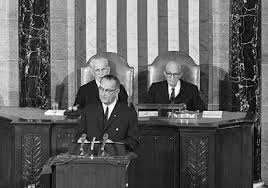 Jan 8: In his first State of the Union Address, President Lyndon Johnson declares, “This administration today, here and now, declares unconditional war on poverty in America. I urge this Congress and all Americans to join with me in that effort.”
Jan 8: In his first State of the Union Address, President Lyndon Johnson declares, “This administration today, here and now, declares unconditional war on poverty in America. I urge this Congress and all Americans to join with me in that effort.”
![]() Jan 11: U.S. Surgeon General Luther Terry releases a report from a committee of experts linking smoking tobacco products with lung cancer, emphysema and heart disease. “Average smokers had a nine-to-tenfold risk of developing lung cancer compared to nonsmokers,” according to the report, “and heavy smokers had at least a twenty-fold risk. …Cigarette smoking is a health hazard of sufficient importance in the United States to warrant appropriate remedial action.”
Jan 11: U.S. Surgeon General Luther Terry releases a report from a committee of experts linking smoking tobacco products with lung cancer, emphysema and heart disease. “Average smokers had a nine-to-tenfold risk of developing lung cancer compared to nonsmokers,” according to the report, “and heavy smokers had at least a twenty-fold risk. …Cigarette smoking is a health hazard of sufficient importance in the United States to warrant appropriate remedial action.”
![]() Jan 13: Bob Dylan’s The Times They Are a-Changin’ is released.
Jan 13: Bob Dylan’s The Times They Are a-Changin’ is released.
![]() Jan 16: The musical Hello Dolly!, starring Carol Channing, opens on Broadway at the St. James Theater.
Jan 16: The musical Hello Dolly!, starring Carol Channing, opens on Broadway at the St. James Theater.
![]()
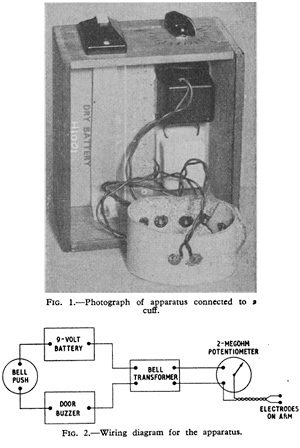 Jan 18: A simple home device for aversion therapy. The instruments that were commonly used for delivering powerful electric shocks in aversion therapy were cumbersome to use and required a professional operator to ensure that the machine was operated safely. Two therapists wrote to the British Medical Journal about a much simpler device that they invented which was so simple to use that “After initial instruction (the patient) can treat himself and may take the apparatus home to continue the treatment there.” Electric shock aversion therapy is commonly used in attempts to “cure” gay men, lesbians and transgender people.
Jan 18: A simple home device for aversion therapy. The instruments that were commonly used for delivering powerful electric shocks in aversion therapy were cumbersome to use and required a professional operator to ensure that the machine was operated safely. Two therapists wrote to the British Medical Journal about a much simpler device that they invented which was so simple to use that “After initial instruction (the patient) can treat himself and may take the apparatus home to continue the treatment there.” Electric shock aversion therapy is commonly used in attempts to “cure” gay men, lesbians and transgender people.
![]() Jan 19: The film Dr. Strangelove or: How I Learned to Stop Worrying and Love the Bomb is released.
Jan 19: The film Dr. Strangelove or: How I Learned to Stop Worrying and Love the Bomb is released.
![]()
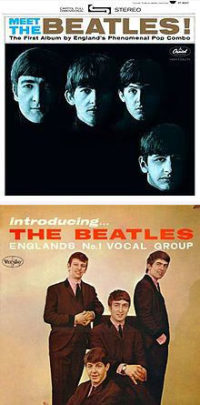 Jan 20: Meet the Beatles!, the first American Beatles album from Capitol Records, is released. The release occurs ten days after a smaller independent label, Vee-Jay Records, released the competing Introducing… The Beatles. The track listing on the Vee-Jay release closely mimics that of the Beatles’ first U.K. album, Please Please Me but omits “Ask Me Why” and the title track. The Capitol release includes the singles “I Wanna Hold Your Hand,” “I Saw Her Standing There,” and “This Boy,” (none of which had been released in the U.K. on an album yet), and adds nine songs from the Beatles’ second U.K. album, With the Beatles. Capitols’ Meet the Beatles! will reach #1 on the Billboard album charts, and Vee-Jay’s Introducing… the Beatles will hit #2, and spark years of legal wrangling between the two labels.
Jan 20: Meet the Beatles!, the first American Beatles album from Capitol Records, is released. The release occurs ten days after a smaller independent label, Vee-Jay Records, released the competing Introducing… The Beatles. The track listing on the Vee-Jay release closely mimics that of the Beatles’ first U.K. album, Please Please Me but omits “Ask Me Why” and the title track. The Capitol release includes the singles “I Wanna Hold Your Hand,” “I Saw Her Standing There,” and “This Boy,” (none of which had been released in the U.K. on an album yet), and adds nine songs from the Beatles’ second U.K. album, With the Beatles. Capitols’ Meet the Beatles! will reach #1 on the Billboard album charts, and Vee-Jay’s Introducing… the Beatles will hit #2, and spark years of legal wrangling between the two labels.
![]() Jan 23: Thirteen years after its proposal and nearly 2 years after its passage by the United States Senate, the 24th Amendment to the United States Constitution, prohibiting the use of poll taxes in national elections, is ratified by the South Dakota legislature. This fulfills the constitutional requirement that amendments be ratified by at least three-fourths of the states in order to become effective. Florida is the only former Confederate state to ratify the amendment. As of 1964, five states still use a poll tax: Alabama, Arkansas, Mississippi, Texas, and Virginia. The amendment will be officially certified on February 4.
Jan 23: Thirteen years after its proposal and nearly 2 years after its passage by the United States Senate, the 24th Amendment to the United States Constitution, prohibiting the use of poll taxes in national elections, is ratified by the South Dakota legislature. This fulfills the constitutional requirement that amendments be ratified by at least three-fourths of the states in order to become effective. Florida is the only former Confederate state to ratify the amendment. As of 1964, five states still use a poll tax: Alabama, Arkansas, Mississippi, Texas, and Virginia. The amendment will be officially certified on February 4.
![]() Jan 29 – Feb 9: The 1964 Winter Olympics take place in Innsbruck, Austria.
Jan 29 – Feb 9: The 1964 Winter Olympics take place in Innsbruck, Austria.
![]() Jan 29: The film Dr. Strangelove or: How I learned to Stop Worrying and Love the Bomb is released in the U.S. and U.K.
Jan 29: The film Dr. Strangelove or: How I learned to Stop Worrying and Love the Bomb is released in the U.S. and U.K.
![]() Jan 30: South Vietnam General Nguyễn Khánh leads a bloodless military coup d’état, replacing Gen. Dương Văn Minh as President. Minh became President following the bloody coup of November 2, 1963 in which President Ngô Đình Diệm was overthrown and assassinated. Nine days later, Khánh will allow Minh to return a a figurehead President, with Khánh retaining the Prime Minister role.
Jan 30: South Vietnam General Nguyễn Khánh leads a bloodless military coup d’état, replacing Gen. Dương Văn Minh as President. Minh became President following the bloody coup of November 2, 1963 in which President Ngô Đình Diệm was overthrown and assassinated. Nine days later, Khánh will allow Minh to return a a figurehead President, with Khánh retaining the Prime Minister role.
| ◄ | February | ► | ▲ | |||
|---|---|---|---|---|---|---|
| 1 | ||||||
| 2 | 3 | 4 | 5 | 6 | 7 | 8 |
| 9 | 10 | 11 | 12 | 13 | 14 | 15 |
| 16 | 17 | 18 | 19 | 20 | 21 | 22 |
| 23 | 24 | 25 | 26 | 27 | 28 | 29 |
![]() Feb 1: Indiana Governor Matthew E. Welsh declares the song “Louie Louie” by The Kingsmen pornographic. He requests that the Indiana Broadcasters Association ban the record. Welsh claims that hearing the song makes his “ears tingle.” Publisher Max Firetag offers $1,000 to anyone who can find anything suggestive in the song’s lyrics.
Feb 1: Indiana Governor Matthew E. Welsh declares the song “Louie Louie” by The Kingsmen pornographic. He requests that the Indiana Broadcasters Association ban the record. Welsh claims that hearing the song makes his “ears tingle.” Publisher Max Firetag offers $1,000 to anyone who can find anything suggestive in the song’s lyrics.
![]() Feb 1: Beatlemania officially takes hold in America as their single “I Want To Hold Your Hand” begins its seven week run at the top of the charts.
Feb 1: Beatlemania officially takes hold in America as their single “I Want To Hold Your Hand” begins its seven week run at the top of the charts.
![]() Feb 7: A Jackson, Mississippi all-male/all-white jury deadlocks in the first trial of Byron De La Beckwith for the 1963 murder of Medgar Evers.
Feb 7: A Jackson, Mississippi all-male/all-white jury deadlocks in the first trial of Byron De La Beckwith for the 1963 murder of Medgar Evers.
![]()
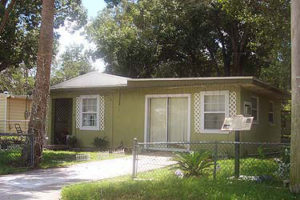 Feb 7: A shotgun is fired into the home of the St. Augustine civil rights leader Dr. Robert Hayling. Hayling is at his office at the time, and Mrs. Hayling, who is pregnant with their third child, is in another part of the house. Two of the blasts go through the front door, and the other two strike the side of the door frame. Some of the pellets go through the house and exit a window in the rear. The family’s dog is found in the living room, dead with two pellet wounds. Neighbors say the saw a white car speeding away from the scene.
Feb 7: A shotgun is fired into the home of the St. Augustine civil rights leader Dr. Robert Hayling. Hayling is at his office at the time, and Mrs. Hayling, who is pregnant with their third child, is in another part of the house. Two of the blasts go through the front door, and the other two strike the side of the door frame. Some of the pellets go through the house and exit a window in the rear. The family’s dog is found in the living room, dead with two pellet wounds. Neighbors say the saw a white car speeding away from the scene.
![]()
 Feb 7: The Beatles arrive in New York’s JFK International Airport to a tumultuous reception by thousands of screaming fans.
Feb 7: The Beatles arrive in New York’s JFK International Airport to a tumultuous reception by thousands of screaming fans.
![]() Feb 8: Segregation supporter Rep. Howard W. Smith (D-VA) proposes an amendment to the Civil Rights Act of 1964 to prohibit employment discrimination on the basis of gender. This is one of many attempts by Southern members of Congress to stall or derail the bill’s passage. Smith’s tactics backfire however when the amendment passes 168-133 and becomes Title VII of the civil rights law.
Feb 8: Segregation supporter Rep. Howard W. Smith (D-VA) proposes an amendment to the Civil Rights Act of 1964 to prohibit employment discrimination on the basis of gender. This is one of many attempts by Southern members of Congress to stall or derail the bill’s passage. Smith’s tactics backfire however when the amendment passes 168-133 and becomes Title VII of the civil rights law.
![]()
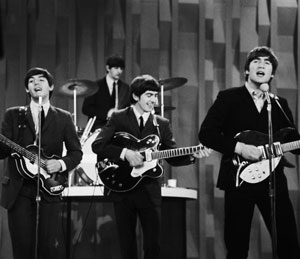 Feb 9: The Beatles make their first American live appearance on The Ed Sullivan Show. An estimated 73 million viewers tune in. This is just the first of three consecutive Sundays in which the Beatles will appear on Ed Sullivan. Televisions in an estimated 23 million homes are tuned in to the broadcast, which is seen by 70 million people.
Feb 9: The Beatles make their first American live appearance on The Ed Sullivan Show. An estimated 73 million viewers tune in. This is just the first of three consecutive Sundays in which the Beatles will appear on Ed Sullivan. Televisions in an estimated 23 million homes are tuned in to the broadcast, which is seen by 70 million people.
![]() Feb 10: The U.S. House of Representatives votes 290-130 to approve the Civil Rights Act of 1960. Voting in favor are 152 Democrats and 138 Republicans. Voting against are 96 Democrats and 34 Republicans, mostly from Southern States.
Feb 10: The U.S. House of Representatives votes 290-130 to approve the Civil Rights Act of 1960. Voting in favor are 152 Democrats and 138 Republicans. Voting against are 96 Democrats and 34 Republicans, mostly from Southern States.
![]() Feb 11: The Beatles hold their first American concert in front of 8,000 screaming fans at the Washington Coliseum.
Feb 11: The Beatles hold their first American concert in front of 8,000 screaming fans at the Washington Coliseum.
![]() Feb 11: Civil war breaks out in Cypress when Greek and Turkish Cypriot residents begin fighting in Limassol. Fifty people will die over the next two days.
Feb 11: Civil war breaks out in Cypress when Greek and Turkish Cypriot residents begin fighting in Limassol. Fifty people will die over the next two days.
![]() Feb 15: The Beatles’ North American-released album Meet the Beatles! begins its eleven weeks at the top of the charts. The album features the songs “I Want to Hold Your Hands,” “I Saw Her Standing There,” “All My Loving,” and “I Wanna Be Your Man.”
Feb 15: The Beatles’ North American-released album Meet the Beatles! begins its eleven weeks at the top of the charts. The album features the songs “I Want to Hold Your Hands,” “I Saw Her Standing There,” “All My Loving,” and “I Wanna Be Your Man.”
![]() Feb 25: Cassius Clay beats Sonny Liston in Miami Beach to win the World Heavyweight Championship.
Feb 25: Cassius Clay beats Sonny Liston in Miami Beach to win the World Heavyweight Championship.
| ◄ | March | ► | ▲ | |||
|---|---|---|---|---|---|---|
| 1 | 2 | 3 | 4 | 5 | 6 | 7 |
| 8 | 9 | 10 | 11 | 12 | 13 | 14 |
| 15 | 16 | 17 | 18 | 19 | 20 | 21 |
| 22 | 23 | 24 | 25 | 26 | 27 | 28 |
| 29 | 30 | 31 | ||||
![]() Mar 4: The U.N. Security Council unanimously authorizes a multinational peacekeeping force in Cyprus.
Mar 4: The U.N. Security Council unanimously authorizes a multinational peacekeeping force in Cyprus.
![]() Mar 6: Cassius Clay announces his name change to Muhammad Ali.
Mar 6: Cassius Clay announces his name change to Muhammad Ali.
![]()
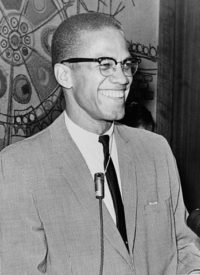 Mar 8: Malcolm X, who was suspended from the Nation of Islam, formerly leaves the body and announces that he is forming a break-away black nationalist mosque calls Muslim Mosque. “I remain a Muslim,” he tells reporters. “but the main emphasis of the new movement will be black nationalism as a political concept and form of social action against the white oppressors.” He says that after Nation of Islam leader Elijah Muhammad imposed ninety days of silence on him after Malcolm’s comments about the Kennedy assassination, he has concluded that the Nation of Islam “has gone as far as it can” because it is too narrowly sectarian. He also is critical of Rev. Martin Luther King, Jr.’s nonviolent approach to civil rights. “I intend to work on my own among America’s 22 million non-Muslim Negroes to convert them from non-violence to active self-defense against white supremacists in all parts of the country.” He also says that he will accept invitations to speak to other civil rights groups. He adds that current members of the Nation of Islam should stay in that organization. “It is not my desire to encourage them to follow me.”
Mar 8: Malcolm X, who was suspended from the Nation of Islam, formerly leaves the body and announces that he is forming a break-away black nationalist mosque calls Muslim Mosque. “I remain a Muslim,” he tells reporters. “but the main emphasis of the new movement will be black nationalism as a political concept and form of social action against the white oppressors.” He says that after Nation of Islam leader Elijah Muhammad imposed ninety days of silence on him after Malcolm’s comments about the Kennedy assassination, he has concluded that the Nation of Islam “has gone as far as it can” because it is too narrowly sectarian. He also is critical of Rev. Martin Luther King, Jr.’s nonviolent approach to civil rights. “I intend to work on my own among America’s 22 million non-Muslim Negroes to convert them from non-violence to active self-defense against white supremacists in all parts of the country.” He also says that he will accept invitations to speak to other civil rights groups. He adds that current members of the Nation of Islam should stay in that organization. “It is not my desire to encourage them to follow me.”
![]()
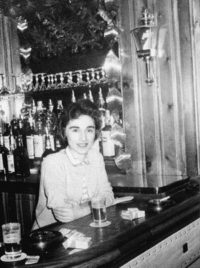 Mar 13: Kitty Genovese is murdered outside of her apartment in the upscale Kew Gardens neighborhood of Queens. When the New York Times publishes a front-page story about the murder two weeks later, Americans will be shocked to learn that 38 “respectable, law-abiding citizens” admit that they had witnessed the crime or heard her screams, but none of them called the police until more than half an hour later. One witness explains his inaction: “I didn’t want to get involved.” That explanation becomes a sad catch phrase, and the story will stand as a cautionary tale about public apathy and urban detachment. (It will be revealed in 2006 that the true number of witnesses was 6 or 7, and that the Times article that described the murder “was almost certainly a misleading account of what happened.”)
Mar 13: Kitty Genovese is murdered outside of her apartment in the upscale Kew Gardens neighborhood of Queens. When the New York Times publishes a front-page story about the murder two weeks later, Americans will be shocked to learn that 38 “respectable, law-abiding citizens” admit that they had witnessed the crime or heard her screams, but none of them called the police until more than half an hour later. One witness explains his inaction: “I didn’t want to get involved.” That explanation becomes a sad catch phrase, and the story will stand as a cautionary tale about public apathy and urban detachment. (It will be revealed in 2006 that the true number of witnesses was 6 or 7, and that the Times article that described the murder “was almost certainly a misleading account of what happened.”)
![]()
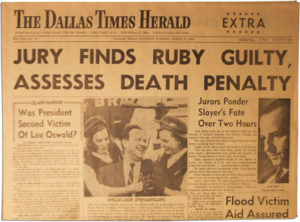 Mar 14: Jack Ruby is found guilty of killing John F. Kennedy assassin Lee Harvey Oswald. He is sentenced to die in the electric chair, although his conviction will be reversed on appeal.
Mar 14: Jack Ruby is found guilty of killing John F. Kennedy assassin Lee Harvey Oswald. He is sentenced to die in the electric chair, although his conviction will be reversed on appeal.
![]() Mar 14: The Beatles occupy the top three spots of the singles charts: “I Want To Hold Your Hand” (#1), “She Loves You (#2) and “Please Please Me” (#3). Billboard reports the sales of Beatles records now makes up 60% of the entire singles market.
Mar 14: The Beatles occupy the top three spots of the singles charts: “I Want To Hold Your Hand” (#1), “She Loves You (#2) and “Please Please Me” (#3). Billboard reports the sales of Beatles records now makes up 60% of the entire singles market.
![]() Mar 15: Richard Burton and Elizabeth Taylor marry for the first time.
Mar 15: Richard Burton and Elizabeth Taylor marry for the first time.
![]()
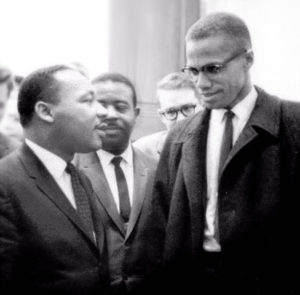 Mar 26: Rev. Martin Luther Kin, Jr., and Malcolm X meet for the first and only time just outside the U.S. Senate chamber, where they have been observing Senate debate on the Civil Rights bill. Before then, they held something of a mini-debate in separate corridor press conferences, with Malcolm saying that the day has arrived when blacks should not longer turn to other cheek, while King stresses his message that non-violence is the strongest weapon in the civil rights arsenal. He warns however that if the civil rights bill fails, King predicts a “dark night of social disruption” because “it will be more difficult for us who believe in non-violence to keep the demonstrations non-violent.” The two meet briefly in a corridor, just after King had finished speaking. They meet just long enough for a brief photo op with reporters.
Mar 26: Rev. Martin Luther Kin, Jr., and Malcolm X meet for the first and only time just outside the U.S. Senate chamber, where they have been observing Senate debate on the Civil Rights bill. Before then, they held something of a mini-debate in separate corridor press conferences, with Malcolm saying that the day has arrived when blacks should not longer turn to other cheek, while King stresses his message that non-violence is the strongest weapon in the civil rights arsenal. He warns however that if the civil rights bill fails, King predicts a “dark night of social disruption” because “it will be more difficult for us who believe in non-violence to keep the demonstrations non-violent.” The two meet briefly in a corridor, just after King had finished speaking. They meet just long enough for a brief photo op with reporters.
![]()
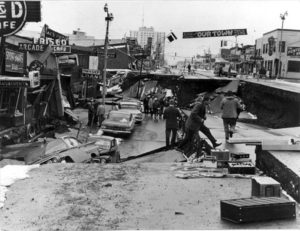 Mar 27: The Good Friday Earthquake strikes south central Alaska, killing 131 people and inflicting massive damage to the city of Anchorage. At a 9.2 magnitude, it is the most powerful earthquake to strike the United States and the second most powerful in recorded history.
Mar 27: The Good Friday Earthquake strikes south central Alaska, killing 131 people and inflicting massive damage to the city of Anchorage. At a 9.2 magnitude, it is the most powerful earthquake to strike the United States and the second most powerful in recorded history.
![]() Mar 28: At shortly after midnight, six hours after the Alaskan earthquake, a wave spawned by the earthquake washes across the small town of Crescent City, California, 1,400 miles away. Waves smash into a 56-square block area and kill eleven people. Damage is reported along the entire coast from British Columbia to southern California.
Mar 28: At shortly after midnight, six hours after the Alaskan earthquake, a wave spawned by the earthquake washes across the small town of Crescent City, California, 1,400 miles away. Waves smash into a 56-square block area and kill eleven people. Damage is reported along the entire coast from British Columbia to southern California.
![]()
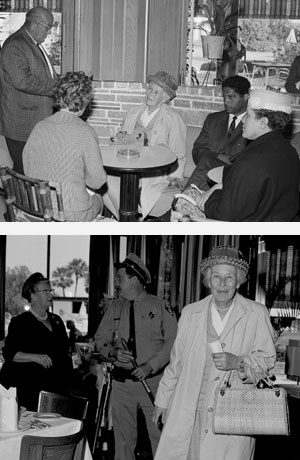 Mar 31: St. Augustine Police arrest several protesters when they refuse to leave the segregated Ponce de Leon Motor Lodge. Among those arrested is Mary Peabody, the 72-year-old wife of a former Episcopal bishop and mother of Endicott Peabody, then-governor of Massachusetts. She and other powerful New England women had flown down to St. Augustine at the behest of Hoesa Williams, Dr. Martin Luther King’s deputy. The group meet with local African-American leaders, and go to the Ponce de Leon’s cocktail lounge for lunch. Five of the group are arrested. The photos of the prim and proper ladies’ arrests appear in newspapers around the world and bring international attention to St. Augustine for the first time. They spend two nights in jail before they are bailed out.
Mar 31: St. Augustine Police arrest several protesters when they refuse to leave the segregated Ponce de Leon Motor Lodge. Among those arrested is Mary Peabody, the 72-year-old wife of a former Episcopal bishop and mother of Endicott Peabody, then-governor of Massachusetts. She and other powerful New England women had flown down to St. Augustine at the behest of Hoesa Williams, Dr. Martin Luther King’s deputy. The group meet with local African-American leaders, and go to the Ponce de Leon’s cocktail lounge for lunch. Five of the group are arrested. The photos of the prim and proper ladies’ arrests appear in newspapers around the world and bring international attention to St. Augustine for the first time. They spend two nights in jail before they are bailed out.
![]()
 Mar 31: Also in St. Augustine, approximately 140 African-Americans demonstrators are arrested after marching from the old Slave Market to the historic Ponce de Leon Hotel and sit at dining room tables in the hotel’s restaurant. Police use dogs to round up the protesters and herd them outside, where about 117 are arrested. This brings the total number of people arrested in four days of peaceful demonstrations to 197. Demonstrations will continue almost nightly.
Mar 31: Also in St. Augustine, approximately 140 African-Americans demonstrators are arrested after marching from the old Slave Market to the historic Ponce de Leon Hotel and sit at dining room tables in the hotel’s restaurant. Police use dogs to round up the protesters and herd them outside, where about 117 are arrested. This brings the total number of people arrested in four days of peaceful demonstrations to 197. Demonstrations will continue almost nightly.
| ◄ | April | ► | ▲ | |||
|---|---|---|---|---|---|---|
| 1 | 2 | 3 | 4 | |||
| 5 | 6 | 7 | 8 | 9 | 10 | 11 |
| 12 | 13 | 14 | 15 | 16 | 17 | 18 |
| 19 | 20 | 21 | 22 | 23 | 24 | 25 |
| 26 | 27 | 28 | 29 | 30 | ||
![]()
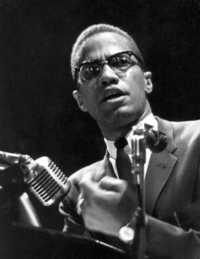 Apr 3: Malcolm X delivers his speech, “The Ballot or the Bullet,” for the first time, at a meeting in Cleveland sponsored by the Congress of Racial Equality at Cory Methodist Church. He says that African-Americans should be extremely cautious about how — or if — they should vote. “A ballot is like a bullet,” he explains. “You don’t throw your ballots until you see a target, and if that target is not within your reach, keep your ballot in your pocket.” He warns that if African-Americans vote for politicians who fail to keep their promises to the black community, then violence may be inevitable. “It’s time now for you and me to become more politically mature and realize what the ballot is for; what we’re supposed to get when we cast a ballot; and that if we don’t cast a ballot, it’s going to end up in a situation where we’re going to have to cast a bullet. It’s either a ballot or a bullet.”
Apr 3: Malcolm X delivers his speech, “The Ballot or the Bullet,” for the first time, at a meeting in Cleveland sponsored by the Congress of Racial Equality at Cory Methodist Church. He says that African-Americans should be extremely cautious about how — or if — they should vote. “A ballot is like a bullet,” he explains. “You don’t throw your ballots until you see a target, and if that target is not within your reach, keep your ballot in your pocket.” He warns that if African-Americans vote for politicians who fail to keep their promises to the black community, then violence may be inevitable. “It’s time now for you and me to become more politically mature and realize what the ballot is for; what we’re supposed to get when we cast a ballot; and that if we don’t cast a ballot, it’s going to end up in a situation where we’re going to have to cast a bullet. It’s either a ballot or a bullet.”
![]() Apr 4: The Beatles single “Can’t Buy Me Love” begins its five week run at the top of the charts. The Beatles now hold all top five positions in the Billboard Top 40. The single, in order are: “Can’t Buy Me Love,” “Twist and Shout,” “She Loves You,” “I Want to Hold Your Hand,” and “Please Please Me.”
Apr 4: The Beatles single “Can’t Buy Me Love” begins its five week run at the top of the charts. The Beatles now hold all top five positions in the Billboard Top 40. The single, in order are: “Can’t Buy Me Love,” “Twist and Shout,” “She Loves You,” “I Want to Hold Your Hand,” and “Please Please Me.”
![]() Apr 5: Gen. Douglas MacArthur dies at the age of 84.
Apr 5: Gen. Douglas MacArthur dies at the age of 84.
![]()
 Apr 7: IBM announces the System/360 mainframe computer system. The System/360 features a modular design that allows IBM to offer a range of models at different prices and capabilities. The computer can perform up to 34,500 instructions per second, and memory ranges from 8KB to 64KB.
Apr 7: IBM announces the System/360 mainframe computer system. The System/360 features a modular design that allows IBM to offer a range of models at different prices and capabilities. The computer can perform up to 34,500 instructions per second, and memory ranges from 8KB to 64KB.
![]() Apr 13: Sidney Poitier becomes the first African-American to win the Oscar for Best Actor in a Leading Role for Lilies of the Field.
Apr 13: Sidney Poitier becomes the first African-American to win the Oscar for Best Actor in a Leading Role for Lilies of the Field.
![]() Apr 13: Malcolm X leaves for what is billed as a three-week tour of Africa. During this time, he will make the Hajj, a traditional annual Muslim pilgrimage to Mecca. The Hajj for 1964 occurs from April 21 to 25.
Apr 13: Malcolm X leaves for what is billed as a three-week tour of Africa. During this time, he will make the Hajj, a traditional annual Muslim pilgrimage to Mecca. The Hajj for 1964 occurs from April 21 to 25.
![]() Apr 16: The Rolling Stones release their debut self-titled album.
Apr 16: The Rolling Stones release their debut self-titled album.
![]()
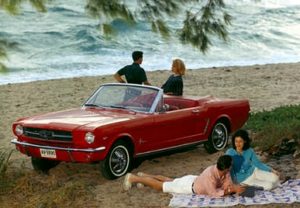 Apr 17: The Ford Mustang goes on sale at Ford dealerships nationwide, with a suggested price tag of $2,368 (about $19,000 today). On its first day on sale, more than 22,000 are sold or ordered.
Apr 17: The Ford Mustang goes on sale at Ford dealerships nationwide, with a suggested price tag of $2,368 (about $19,000 today). On its first day on sale, more than 22,000 are sold or ordered.
![]() Apr 20: Nelson Mandela makes his “I Am Prepared To Die” speech at the opening of the Rivonia Trial. Mandela was already serving a five year prison term when new charges were filed for sabotage, which carry a possible death sentence. Mandela tells the court: “During my lifetime I have dedicated my life to this struggle of the African people. I have fought against white domination, and I have fought against black domination. I have cherished the ideal of a democratic and free society in which all persons will live together in harmony and with equal opportunities. It is an ideal for which I hope to live for and to see realised. But, my Lord, if it needs be, it is an ideal for which I am prepared to die.”
Apr 20: Nelson Mandela makes his “I Am Prepared To Die” speech at the opening of the Rivonia Trial. Mandela was already serving a five year prison term when new charges were filed for sabotage, which carry a possible death sentence. Mandela tells the court: “During my lifetime I have dedicated my life to this struggle of the African people. I have fought against white domination, and I have fought against black domination. I have cherished the ideal of a democratic and free society in which all persons will live together in harmony and with equal opportunities. It is an ideal for which I hope to live for and to see realised. But, my Lord, if it needs be, it is an ideal for which I am prepared to die.”
![]()
 Apr 22: The New York World’s Fair opens in Flushing Meadows for the first of two six-month seasons. The Bureau of International Expositions, an international Paris-based organization that officially sanctions world fairs, refuses to recognize the New York fair because BIE rules allow only one exposition in any given country within a ten year period, and the Seattle World’s Fair in 1962 means that the New York fair violates the rule. Consequently, most BIE members — including Canada, Australia, most of Europe and the Soviet Union — are absent. Fair organizers also refuse to host a midway, and what few rides were there were mostly dull. Consequently, attendance is far below expectations.
Apr 22: The New York World’s Fair opens in Flushing Meadows for the first of two six-month seasons. The Bureau of International Expositions, an international Paris-based organization that officially sanctions world fairs, refuses to recognize the New York fair because BIE rules allow only one exposition in any given country within a ten year period, and the Seattle World’s Fair in 1962 means that the New York fair violates the rule. Consequently, most BIE members — including Canada, Australia, most of Europe and the Soviet Union — are absent. Fair organizers also refuse to host a midway, and what few rides were there were mostly dull. Consequently, attendance is far below expectations.
![]()
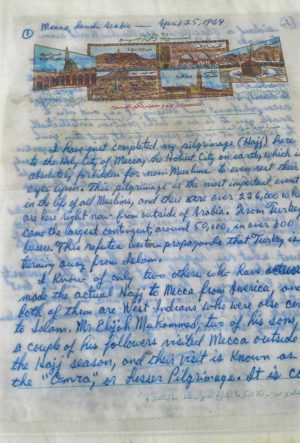 Apr 25: On the last day of the Hajj in Mecca, Malcolm X writes a letter to an undisclosed recipient in the U.S. The letter reveals a transformation in his views about race. “There are Muslims here of all colors and from every part of this earth,” he writes. … I have eaten. From the same plate, drank from the same glass and slept on the same bed or rug … with fellow Muslims whose skin was the whitest of white, whose eyes was the bluest of blue, and whose hair was the blondest of blond – I could look into their blue eyes and see that they regarded me as the same (Brothers), because their faith in One God (Allah) had actually removed “white” from their mind, which automatically changed their attitude and their behavior (towards) people of other colors.” He suggests that “If white Americans could accept the religion of Islam … they too could then sincerely accept the Oneness of Men, and cease to measure others always in terms of their ‘difference in color’. … I do believe that Whites of the younger generation, in the colleges and universities, through their own young, less hampered intellects will see the ‘Handwriting on the Wall’ and turn for spiritual salvation to the religion of Islam, and force the older generation to turn with them.”
Apr 25: On the last day of the Hajj in Mecca, Malcolm X writes a letter to an undisclosed recipient in the U.S. The letter reveals a transformation in his views about race. “There are Muslims here of all colors and from every part of this earth,” he writes. … I have eaten. From the same plate, drank from the same glass and slept on the same bed or rug … with fellow Muslims whose skin was the whitest of white, whose eyes was the bluest of blue, and whose hair was the blondest of blond – I could look into their blue eyes and see that they regarded me as the same (Brothers), because their faith in One God (Allah) had actually removed “white” from their mind, which automatically changed their attitude and their behavior (towards) people of other colors.” He suggests that “If white Americans could accept the religion of Islam … they too could then sincerely accept the Oneness of Men, and cease to measure others always in terms of their ‘difference in color’. … I do believe that Whites of the younger generation, in the colleges and universities, through their own young, less hampered intellects will see the ‘Handwriting on the Wall’ and turn for spiritual salvation to the religion of Islam, and force the older generation to turn with them.”
![]() Apr 26: Tanganyika and Zanzibar merge to form the nation of Tanzania.
Apr 26: Tanganyika and Zanzibar merge to form the nation of Tanzania.
| ◄ | May | ► | ▲ | |||
|---|---|---|---|---|---|---|
| 1 | 2 | |||||
| 3 | 4 | 5 | 6 | 7 | 8 | 9 |
| 10 | 11 | 12 | 13 | 14 | 15 | 16 |
| 17 | 18 | 19 | 20 | 21 | 22 | 23 |
| 24 | 25 | 26 | 27 | 28 | 29 | 30 |
| 31 | ||||||
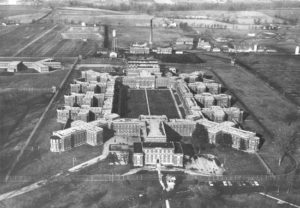 May: A treatment program for homosexuals at an Ohio psychiatric hospital. In an article appearing in the May 1964 edition of the journal Diseases of the Nervous System, Dr. Rudolph Buki reveals that gay men held at the Lima State Hospital for the Criminally Insane are given Trifluoperazine (primarily used for schizophrenia) and tranylcypromine, an antidepressant that also causes sexual dysfunction. That’s not all it did. According to the Physicians’ Desk Reference, tranylcypromine should be given only as a last resort and can cause severe convulsions, shock or coma, hypertensive crises, peripheral vascular collapse, and intracranial bleeding. Buki writes that the medication is combined with educational therapy or group therapy, and that one-third of the thirty-six studied are “good remission cases” and recommended for release.
May: A treatment program for homosexuals at an Ohio psychiatric hospital. In an article appearing in the May 1964 edition of the journal Diseases of the Nervous System, Dr. Rudolph Buki reveals that gay men held at the Lima State Hospital for the Criminally Insane are given Trifluoperazine (primarily used for schizophrenia) and tranylcypromine, an antidepressant that also causes sexual dysfunction. That’s not all it did. According to the Physicians’ Desk Reference, tranylcypromine should be given only as a last resort and can cause severe convulsions, shock or coma, hypertensive crises, peripheral vascular collapse, and intracranial bleeding. Buki writes that the medication is combined with educational therapy or group therapy, and that one-third of the thirty-six studied are “good remission cases” and recommended for release.![]() May 2: About a thousand students participate in the first major demonstration against the Vietnam War in New York City. The “May 2nd Movement” is organized by Yale students. Other marches take place in San Francisco, Boston, Seattle, and Madison, Wisconsin.
May 2: About a thousand students participate in the first major demonstration against the Vietnam War in New York City. The “May 2nd Movement” is organized by Yale students. Other marches take place in San Francisco, Boston, Seattle, and Madison, Wisconsin.
![]()
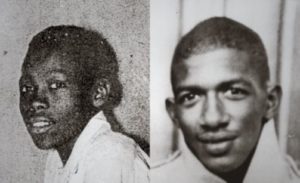 May 2: Henry Hezekiah Dee and Charles Eddie Moore, hitchhiking in Meadville, Mississippi, are kidnapped and beaten by members of the Ku Klux Klan. Their badly decomposed bodies will be found by chance in July during the search for the three victims of the Mississippi civil rights workers’ murders.
May 2: Henry Hezekiah Dee and Charles Eddie Moore, hitchhiking in Meadville, Mississippi, are kidnapped and beaten by members of the Ku Klux Klan. Their badly decomposed bodies will be found by chance in July during the search for the three victims of the Mississippi civil rights workers’ murders.
![]() May 2: The Beatles’ Second Album, a Capitol North American release, begins its five week run at the top of the album charts. The album features “She Loves You,” and a cover of Chuck Berry’s “Roll Over Beethoven.”
May 2: The Beatles’ Second Album, a Capitol North American release, begins its five week run at the top of the album charts. The album features “She Loves You,” and a cover of Chuck Berry’s “Roll Over Beethoven.”
![]()
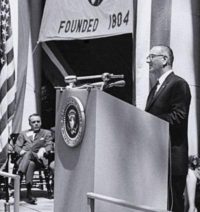 May 7: During a speech at Ohio University in Athens, President Johnson first uses the phrase that will come to define his domestic policy: “America is yours — yours to make a better land — yours to build the great society.”
May 7: During a speech at Ohio University in Athens, President Johnson first uses the phrase that will come to define his domestic policy: “America is yours — yours to make a better land — yours to build the great society.”
![]() May 16: Twelve young men publicly burn their draft cards in New York City’s Union Square to protest American involvement in the Vietnam War. This is believed to be the first protest of its kind in the Vietnam era.
May 16: Twelve young men publicly burn their draft cards in New York City’s Union Square to protest American involvement in the Vietnam War. This is believed to be the first protest of its kind in the Vietnam era.
![]() May 21: Malcolm X appears at a press conference in Harlem after returning from Africa and Mecca.
May 21: Malcolm X appears at a press conference in Harlem after returning from Africa and Mecca.
![]()
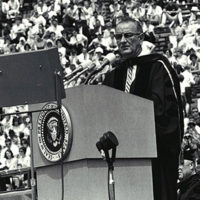 May 22: President Johnson formally introduces his vision for a Great Society at a commencement speech at the University of Michigan in Ann Arbor. “For in your time,” he tells graduates, “we have the opportunity to move not only toward the rich society and the powerful society, but upward to the Great Society … (which) rests on abundance and liberty for all… demands an end to poverty and racial injustice.. a place where every child can find knowledge to enrich his mind and to enlarge his talents.”
May 22: President Johnson formally introduces his vision for a Great Society at a commencement speech at the University of Michigan in Ann Arbor. “For in your time,” he tells graduates, “we have the opportunity to move not only toward the rich society and the powerful society, but upward to the Great Society … (which) rests on abundance and liberty for all… demands an end to poverty and racial injustice.. a place where every child can find knowledge to enrich his mind and to enlarge his talents.”
![]() May 24: Sen. Barry Goldwater (R-AZ), a candidate for the Republican nomination for President, suggests that nuclear weapons could find a huse in the Vietnam War. The statement comes during an interview with Howard K. Smith on the Sunday morning ABC program Issues and Answers. Godwater suggests that “defoliation of the forests by low yield atomic weapons could well be done. … When you remove the foliage, your remove the cover.” U.N General Secretary U Thant responds that anyone advocating the use of nuclear weapons in Vietnam is “out of his mind.” Democrats see the the statement as a gift, and will use it to reinforce the idea that Goldwater will recklessly lead the U.S. into a major nuclear conflict.
May 24: Sen. Barry Goldwater (R-AZ), a candidate for the Republican nomination for President, suggests that nuclear weapons could find a huse in the Vietnam War. The statement comes during an interview with Howard K. Smith on the Sunday morning ABC program Issues and Answers. Godwater suggests that “defoliation of the forests by low yield atomic weapons could well be done. … When you remove the foliage, your remove the cover.” U.N General Secretary U Thant responds that anyone advocating the use of nuclear weapons in Vietnam is “out of his mind.” Democrats see the the statement as a gift, and will use it to reinforce the idea that Goldwater will recklessly lead the U.S. into a major nuclear conflict.
![]()
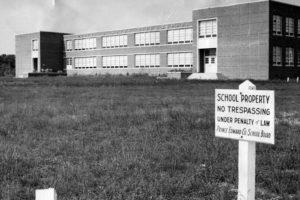 May 25: In the case of Griffin v. County School Board of Prince Edward County, the U.S. Supreme Court orders Prince Edward County, Virginia, to re-open its public schools. The county had closed its schools in 1959 rather than integrate them, and state’s high court ruled that the state was not required to operate public schools in any of its counties. Justice Hugo Black wrote, Prince Edward children must go to a private school or none at all; all other Virginia children can go to public schools,” which denied Prince Edward County students equal rights.
May 25: In the case of Griffin v. County School Board of Prince Edward County, the U.S. Supreme Court orders Prince Edward County, Virginia, to re-open its public schools. The county had closed its schools in 1959 rather than integrate them, and state’s high court ruled that the state was not required to operate public schools in any of its counties. Justice Hugo Black wrote, Prince Edward children must go to a private school or none at all; all other Virginia children can go to public schools,” which denied Prince Edward County students equal rights.
![]() May 27: Jawaharial Nehru, India’s prime minister since the nation’s independence in 1947, dies from a ruptured aorta at the age of 74.
May 27: Jawaharial Nehru, India’s prime minister since the nation’s independence in 1947, dies from a ruptured aorta at the age of 74.
| ◄ | June | ► | ▲ | |||
|---|---|---|---|---|---|---|
| 1 | 2 | 3 | 4 | 5 | 6 | |
| 7 | 8 | 9 | 10 | 11 | 12 | 13 |
| 14 | 15 | 16 | 17 | 18 | 19 | 20 |
| 21 | 22 | 23 | 24 | 25 | 26 | 27 |
| 28 | 29 | 30 | ||||
![]() Jun 5: Lisa Cholodenko, American screenwriter and film director (High Art, Laurel Canyon, The Kids Are All Right) is born.
Jun 5: Lisa Cholodenko, American screenwriter and film director (High Art, Laurel Canyon, The Kids Are All Right) is born.
![]()
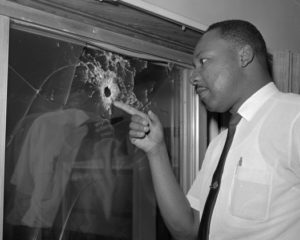 Jun 7: A beach cottage in St. Augustine, Florida that serves as a temporary residence for Rev. Martin Luther King, Jr., is riddled with nineteen bullets after a local newspaper prints directions to the cottage. No one is inside at the time.
Jun 7: A beach cottage in St. Augustine, Florida that serves as a temporary residence for Rev. Martin Luther King, Jr., is riddled with nineteen bullets after a local newspaper prints directions to the cottage. No one is inside at the time.
![]() Jun 10: The U.S. Senate votes 71-29 to invoke cloture to end the longest filibuster in Senate history. The 75-day long filibuster against the Civil Rights Act of 1964 is conducted by eighteen Southern senators. Sen. Richard Russell (D-GA) leads the filibuster, saying, “We will resist to the bitter end any measure or any movement which would have a tendency to bring about social equality and intermingling and amalgamation of the races in our states.” Sen. Robert C. Byrd (D-WV) completes his filibuster speech at 9:51 a.m., fourteen hours and thirteen minutes after he started the previous evening. A cloture vote requires at least two-thrids of the Senators present, or 67 votes, to pass, and the Senate is able to end debate with four votes to spare. This sets the stage for a vote on the Civil Rights Act the following week.
Jun 10: The U.S. Senate votes 71-29 to invoke cloture to end the longest filibuster in Senate history. The 75-day long filibuster against the Civil Rights Act of 1964 is conducted by eighteen Southern senators. Sen. Richard Russell (D-GA) leads the filibuster, saying, “We will resist to the bitter end any measure or any movement which would have a tendency to bring about social equality and intermingling and amalgamation of the races in our states.” Sen. Robert C. Byrd (D-WV) completes his filibuster speech at 9:51 a.m., fourteen hours and thirteen minutes after he started the previous evening. A cloture vote requires at least two-thrids of the Senators present, or 67 votes, to pass, and the Senate is able to end debate with four votes to spare. This sets the stage for a vote on the Civil Rights Act the following week.
![]()
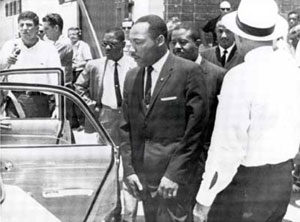 Jun 11: St. Augustine, Florida, police arrest Rev. Martin Luther King, Jr., Rev. Ralph Abernathy and ten other civil rights demonstrators during an attempted sit-in at a segregated restaurant in Monson Motor Lodge. They are charged with trespassing, violating an undesirable guest law, and conspiracy. James Brock, the motel’s manager, is also the president of the Florida Hotel and Motel Association. Later that night, a riot breaks out when a crowd of whites attack a peaceful march of African-Americans to the Old Slave Market downtown. Gov. Farris Bryant sends the state police to St. Augustine to restore order. Nightly protests will resume a few days later.
Jun 11: St. Augustine, Florida, police arrest Rev. Martin Luther King, Jr., Rev. Ralph Abernathy and ten other civil rights demonstrators during an attempted sit-in at a segregated restaurant in Monson Motor Lodge. They are charged with trespassing, violating an undesirable guest law, and conspiracy. James Brock, the motel’s manager, is also the president of the Florida Hotel and Motel Association. Later that night, a riot breaks out when a crowd of whites attack a peaceful march of African-Americans to the Old Slave Market downtown. Gov. Farris Bryant sends the state police to St. Augustine to restore order. Nightly protests will resume a few days later.
![]() Jun 12: Nelson Mandela and seven others are sentenced to life imprisonment.
Jun 12: Nelson Mandela and seven others are sentenced to life imprisonment.
![]()
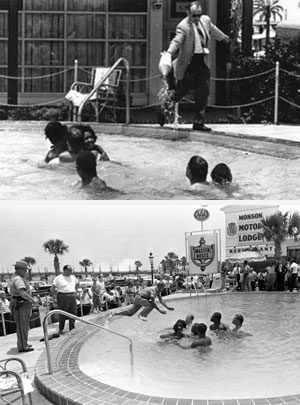 Jun 18: A “swim-in” takes place in St. Augustine, Florida, at the Monson Motor Lodge when five African-American and two white swimmers try to integrate the motel’s swimming pool. The motel’s manager, James Brock, who is also the president of the Florida Hotel and Motel Association, rushes to the pool with a gallon jug of muriatic acid (used to adjust a pool water’s pH) and dumps it into the pool. None of the swimmers are harmed by the acid. One police officer jumps into the pool to help chase the swimmers out, while other officers around the pool hit swimmers with their clubs. The next day, Brock will run a Confederate flag up the motel’s flag pole.
Jun 18: A “swim-in” takes place in St. Augustine, Florida, at the Monson Motor Lodge when five African-American and two white swimmers try to integrate the motel’s swimming pool. The motel’s manager, James Brock, who is also the president of the Florida Hotel and Motel Association, rushes to the pool with a gallon jug of muriatic acid (used to adjust a pool water’s pH) and dumps it into the pool. None of the swimmers are harmed by the acid. One police officer jumps into the pool to help chase the swimmers out, while other officers around the pool hit swimmers with their clubs. The next day, Brock will run a Confederate flag up the motel’s flag pole.
![]() Jun 19: The Civil Rights Act of 1964 passes the Senate on a 73-27 vote. Those entering the hall of shame by voting no are all but one senator of the Southern block: Alabama: Joseph Hill (D), John Sparkman (D) Arkansas: James Fullbright (D), John McClellan (D); Florida: Spessard Holland (D), George Smathers (D); Georgia: Richard Russell (D), Herman Talmadge (D); Louisiana: Allen Elllender (D), Russell Long (D); Mississippi: James Eastland (D), John Stennis (D); North Carolina: Sam Ervin (D), Benjamin Jordan (D); South Carolina: Olin Johnston (D), Strom Thurmond (D); Tennessee: Albert Gore, Sr. (D), Herbert Walters (D); Texas: John Tower (R-TX); Virginia: Harry Byrd (D), and Absalom Robertson (D). Texas Sen. Ralph Yarborough (D) bucks his colleagues and does the right thing by voting “yes.” Also voting “no” are: Republican presidential candidate Barry Goldwater (R-AZ), Robert Byrd (D-WV), Norris Cotton (R-NH), Bourke Hickenlooper (R-IA), Edwin Mechem (R-NM), Milward Simpson (R-WY), and John Tower (R-TX). Because of a few modifications to the bill made in the Senate, it will now have to return to the House for re-approval.
Jun 19: The Civil Rights Act of 1964 passes the Senate on a 73-27 vote. Those entering the hall of shame by voting no are all but one senator of the Southern block: Alabama: Joseph Hill (D), John Sparkman (D) Arkansas: James Fullbright (D), John McClellan (D); Florida: Spessard Holland (D), George Smathers (D); Georgia: Richard Russell (D), Herman Talmadge (D); Louisiana: Allen Elllender (D), Russell Long (D); Mississippi: James Eastland (D), John Stennis (D); North Carolina: Sam Ervin (D), Benjamin Jordan (D); South Carolina: Olin Johnston (D), Strom Thurmond (D); Tennessee: Albert Gore, Sr. (D), Herbert Walters (D); Texas: John Tower (R-TX); Virginia: Harry Byrd (D), and Absalom Robertson (D). Texas Sen. Ralph Yarborough (D) bucks his colleagues and does the right thing by voting “yes.” Also voting “no” are: Republican presidential candidate Barry Goldwater (R-AZ), Robert Byrd (D-WV), Norris Cotton (R-NH), Bourke Hickenlooper (R-IA), Edwin Mechem (R-NM), Milward Simpson (R-WY), and John Tower (R-TX). Because of a few modifications to the bill made in the Senate, it will now have to return to the House for re-approval.
![]() Jun 19: After the vote, Sens. Edward Kennedy and Birch Bayh are seriously injured when the private plane they’re flying in crashes in Southhampton, Massachusetts. The pilot is killed. Kennedy’s back is broken and he will remain hospitalized for the next six months.
Jun 19: After the vote, Sens. Edward Kennedy and Birch Bayh are seriously injured when the private plane they’re flying in crashes in Southhampton, Massachusetts. The pilot is killed. Kennedy’s back is broken and he will remain hospitalized for the next six months.
![]()
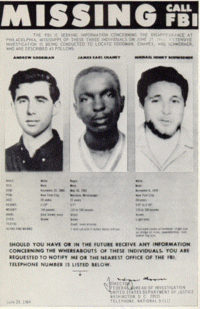 Jun 21: Three Congress of Racial Equality workers — Andrew Goodman, James Chaney and Michael Schwerner — are abducted and murdered near Philadelphia, Mississippi. While passing through Philadelphia, they are arrested by a sheriff’s deputy and jailed. They are released later that night and allowed to leave town under a police escort, only to be pulled over again and shot by local members of the White Knights of the Ku Klux Klan. Their bodies are not found until August 4.
Jun 21: Three Congress of Racial Equality workers — Andrew Goodman, James Chaney and Michael Schwerner — are abducted and murdered near Philadelphia, Mississippi. While passing through Philadelphia, they are arrested by a sheriff’s deputy and jailed. They are released later that night and allowed to leave town under a police escort, only to be pulled over again and shot by local members of the White Knights of the Ku Klux Klan. Their bodies are not found until August 4.
![]()
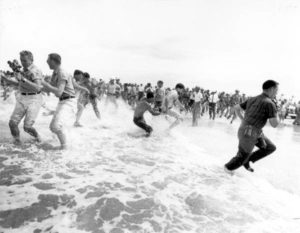 Jun 22: Two massive brawls breaks out in St. Augustine, Florida, in two separate attempts by African-American and white demonstrators to swim in a whites-only public beach. They are attacked both times by a white mob with clubs. Police rush into the water to break up the fight. Altogether, eleven white assailants and nine integrationists are arrested.
Jun 22: Two massive brawls breaks out in St. Augustine, Florida, in two separate attempts by African-American and white demonstrators to swim in a whites-only public beach. They are attacked both times by a white mob with clubs. Police rush into the water to break up the fight. Altogether, eleven white assailants and nine integrationists are arrested.
![]() Jun 22: Henry Miller’s Tropic of Cancer is allowed to circulate legally in the United States three decades after its original publication in France, after the U.S. Supreme Court, in Grove Press, Inc. v. Gerstein, cites Jacobellis v. Ohio (which is decided the same day) and overrules state court findings that the book is obscene.
Jun 22: Henry Miller’s Tropic of Cancer is allowed to circulate legally in the United States three decades after its original publication in France, after the U.S. Supreme Court, in Grove Press, Inc. v. Gerstein, cites Jacobellis v. Ohio (which is decided the same day) and overrules state court findings that the book is obscene.
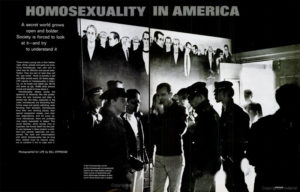 Jun 26: Life publishes “Homosexuality In America”. The opening paragraphs and the accompanying photo described the Tool Box, a San Francisco bar that was popular with the leather crowd. Over the next fourteen pages, Life magazine explored that so-called “sordid world”: in New York, Chicago, Los Angeles, and San Francisco, “which rates as the ‘gay capital’ [with] 30 bars that cater exclusively to a homosexual clientele.” Hal Call, president of what little remained of the Mattachine Society, praised the article as “the first time a national magazine had ever treated the subject of homosexuality with any sensitivity or understanding.” But in what passed as “fair and balanced” for its day, Life also documented a Los Angeles police officer acting as a decoy, entrapping gay men into propositioning him. One educational pamphlet compiled for Los Angeles police warned that what gay men really want is “a fruit world.” Life continued: “Although the anti-homosexual stand taken by the Los Angeles police is unswervingly tough, it reflects the attitude of most U.S. law-enforcement agencies on the subject.”
Jun 26: Life publishes “Homosexuality In America”. The opening paragraphs and the accompanying photo described the Tool Box, a San Francisco bar that was popular with the leather crowd. Over the next fourteen pages, Life magazine explored that so-called “sordid world”: in New York, Chicago, Los Angeles, and San Francisco, “which rates as the ‘gay capital’ [with] 30 bars that cater exclusively to a homosexual clientele.” Hal Call, president of what little remained of the Mattachine Society, praised the article as “the first time a national magazine had ever treated the subject of homosexuality with any sensitivity or understanding.” But in what passed as “fair and balanced” for its day, Life also documented a Los Angeles police officer acting as a decoy, entrapping gay men into propositioning him. One educational pamphlet compiled for Los Angeles police warned that what gay men really want is “a fruit world.” Life continued: “Although the anti-homosexual stand taken by the Los Angeles police is unswervingly tough, it reflects the attitude of most U.S. law-enforcement agencies on the subject.”| ◄ | July | ► | ▲ | |||
|---|---|---|---|---|---|---|
| 1 | 2 | 3 | 4 | |||
| 5 | 6 | 7 | 8 | 9 | 10 | 11 |
| 12 | 13 | 14 | 15 | 16 | 17 | 18 |
| 19 | 20 | 21 | 22 | 23 | 24 | 25 |
| 26 | 27 | 28 | 29 | 30 | 31 | |
![]() Jul 1: Malcolm X says that if the federal government fails to protect the lives and property of African-Americans from “terror and brutality” of the Ku Klux Klan, then he would send armed guerrillas groups into the South to fight the Klan. “The only way an inferior force can compete against a better armed superior force is with the science of guerrilla warfare,” he says. “The Klan elements in the South are well known. We believe that whenever they strike against the Negro, the Negro has a chance to strike back.” He also says that he would use white infiltrators to gather intelligence about Klan activities. “And you would be surprised how many whites, students and older persons, are fed up with the situation.”
Jul 1: Malcolm X says that if the federal government fails to protect the lives and property of African-Americans from “terror and brutality” of the Ku Klux Klan, then he would send armed guerrillas groups into the South to fight the Klan. “The only way an inferior force can compete against a better armed superior force is with the science of guerrilla warfare,” he says. “The Klan elements in the South are well known. We believe that whenever they strike against the Negro, the Negro has a chance to strike back.” He also says that he would use white infiltrators to gather intelligence about Klan activities. “And you would be surprised how many whites, students and older persons, are fed up with the situation.”
![]()
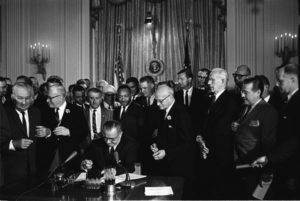 Jul 2: Just three hours after the House of Representatives re-approve the Senate version of the Civil Rights Act of 1964, President Lyndon Johnson signs it law. It is the strongest civil rights law in nearly a century, and despite vigorous opposition from Southern legislators, it passed Congress with overwhelming bipartisan support. “We have come now to a time of testing,” says Johnson. “We must not fail. … I urge every public official, every religious leader, every business and professional man, every working man, every housewife — I urge every American — to join in this effort to bring justice and hope to all our people and peace to our land.”
Jul 2: Just three hours after the House of Representatives re-approve the Senate version of the Civil Rights Act of 1964, President Lyndon Johnson signs it law. It is the strongest civil rights law in nearly a century, and despite vigorous opposition from Southern legislators, it passed Congress with overwhelming bipartisan support. “We have come now to a time of testing,” says Johnson. “We must not fail. … I urge every public official, every religious leader, every business and professional man, every working man, every housewife — I urge every American — to join in this effort to bring justice and hope to all our people and peace to our land.”
![]() Jul 3: An interview of Malcolm X by UPI reporter Bruce B. Miller appears in newspapers across the country detailing Malcolm’s “about face” concerning black separatism. The former Nation of Islam spokesperson says that the group’s leader, Elijah Muhammad, “taught that the whole white race was a race of devils. When I went to the holy city of Mecca (earlier this year) I found white men walking arm and arm with black men. I wrote back to that effect and it infuriated Muhammad.” Malcolm had recently formed the Organization of Afro-American Unity, whose aims, broadly, “are self-defense, political, economic, educational, social and cultural. We believe basically there are only two kinds of power that count in America — political and economic. Social power comes from these.” He says that the OAAU will concern itself with “human rights rather than just civil rights,” and that he plans to work with other black and white leaders. But he also reiterates his call for blacks to arm themselves for self-defense, and to send “guerrilla squads” into the South to protect blacks from the “Ku Klux Klan element.” Miller concludes: “Although there is a big difference between him and the Rev. Martin Luther King … he is now working toward the same goal. The difference — and there is a great difference — is in speed and tactics.”
Jul 3: An interview of Malcolm X by UPI reporter Bruce B. Miller appears in newspapers across the country detailing Malcolm’s “about face” concerning black separatism. The former Nation of Islam spokesperson says that the group’s leader, Elijah Muhammad, “taught that the whole white race was a race of devils. When I went to the holy city of Mecca (earlier this year) I found white men walking arm and arm with black men. I wrote back to that effect and it infuriated Muhammad.” Malcolm had recently formed the Organization of Afro-American Unity, whose aims, broadly, “are self-defense, political, economic, educational, social and cultural. We believe basically there are only two kinds of power that count in America — political and economic. Social power comes from these.” He says that the OAAU will concern itself with “human rights rather than just civil rights,” and that he plans to work with other black and white leaders. But he also reiterates his call for blacks to arm themselves for self-defense, and to send “guerrilla squads” into the South to protect blacks from the “Ku Klux Klan element.” Miller concludes: “Although there is a big difference between him and the Rev. Martin Luther King … he is now working toward the same goal. The difference — and there is a great difference — is in speed and tactics.”
![]()
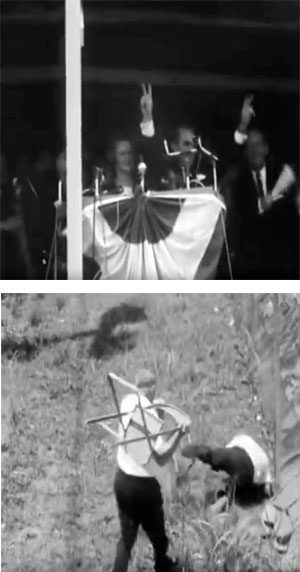 Jul 4: Speaking at a segregationist rally in Atlanta, Gov. George Wallace of Alabama delivers a blistering attack on the Civil Rights Act as “a fraud, a sham, and a hoax…. rammed through the Congress on a wave of ballyhoo, promotions and publicity stunts.” He announces he is running for President, not to win, but to become a power broker by denying either Republicans or Democrats from getting the majority of electoral votes. “If our friends in Georgia will join with the people of my state,” he declares, “we’re going to determine who sits in the White House next year.” Former Mississippi Gov. Ross Barnett is on hand to support Wallace’s campaign. “Stop voting for either party until that party deserves your vote,” he says.” Make them come to the South, instead of bowing and scraping to every two bit Negro politician who sticks a ‘Reverend’ in front of his name…” While Barnett is speaking, three African-American male students and one white female student, members of the Student Nonviolent Coordinating Committee, walk to the middle of a large grandstand area and protest the speech. The men are beaten with folding metal chairs and fists. Meanwhile, whites attack blacks in front of a newly-integrated theater in in Selma, Alabama, and about 250 hooded Klansmen carrying Confederate flags march silently through St. Augustine, Florida.
Jul 4: Speaking at a segregationist rally in Atlanta, Gov. George Wallace of Alabama delivers a blistering attack on the Civil Rights Act as “a fraud, a sham, and a hoax…. rammed through the Congress on a wave of ballyhoo, promotions and publicity stunts.” He announces he is running for President, not to win, but to become a power broker by denying either Republicans or Democrats from getting the majority of electoral votes. “If our friends in Georgia will join with the people of my state,” he declares, “we’re going to determine who sits in the White House next year.” Former Mississippi Gov. Ross Barnett is on hand to support Wallace’s campaign. “Stop voting for either party until that party deserves your vote,” he says.” Make them come to the South, instead of bowing and scraping to every two bit Negro politician who sticks a ‘Reverend’ in front of his name…” While Barnett is speaking, three African-American male students and one white female student, members of the Student Nonviolent Coordinating Committee, walk to the middle of a large grandstand area and protest the speech. The men are beaten with folding metal chairs and fists. Meanwhile, whites attack blacks in front of a newly-integrated theater in in Selma, Alabama, and about 250 hooded Klansmen carrying Confederate flags march silently through St. Augustine, Florida.
![]() Jul 6: American film editor, composer and director John Ottman is born.
Jul 6: American film editor, composer and director John Ottman is born.
![]() Jul 6: Malawi, formerly the British protectorate of Nyasaland, gains its independence.
Jul 6: Malawi, formerly the British protectorate of Nyasaland, gains its independence.
![]() Jul 6: The film A Hard Day’s Night premieres in Britain.
Jul 6: The film A Hard Day’s Night premieres in Britain.
![]() Jul 8: The Defense Department announces that there have been 1,387 casualties in Vietnam “since American forces became fully involved in the jungle war in 1961.” The figure is broken down as “152 killed in action, 96 deaths not related to combat, 971 wounded in action, 151 non-battle injuries and 17 missing in action.”
Jul 8: The Defense Department announces that there have been 1,387 casualties in Vietnam “since American forces became fully involved in the jungle war in 1961.” The figure is broken down as “152 killed in action, 96 deaths not related to combat, 971 wounded in action, 151 non-battle injuries and 17 missing in action.”
![]()
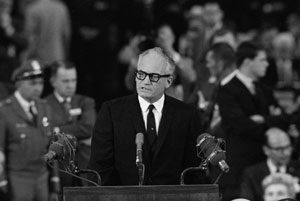 Jul 16: At the Republican National Convention in San Francisco, Arizona Sen. Barry Goldwater accepts his party’s nomination for President with an answer to critics who charge that his conservatism is too extreme. “I would remind you that extremism in the defense of liberty is no vice. And let me remind you also that moderation in the pursuit of justice is no virtue.”
Jul 16: At the Republican National Convention in San Francisco, Arizona Sen. Barry Goldwater accepts his party’s nomination for President with an answer to critics who charge that his conservatism is too extreme. “I would remind you that extremism in the defense of liberty is no vice. And let me remind you also that moderation in the pursuit of justice is no virtue.”
![]()
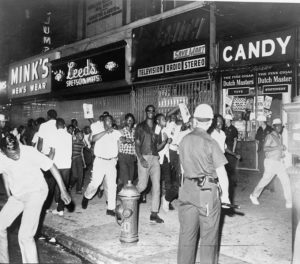 Jul 18: Race riots break out in Harlem when police begin arresting leaders of a protest against police brutality and the police shooting of 15-year-old James Powell two days earlier. When the arrests begin, members of a 4,000-strong crowd begin throwing bricks and Molotov cocktails at the station. Rioting will continue for the next six days, in which 140 people are injured, one is killed, 520 are arrested, and 500 buildings are damaged or destroyed.
Jul 18: Race riots break out in Harlem when police begin arresting leaders of a protest against police brutality and the police shooting of 15-year-old James Powell two days earlier. When the arrests begin, members of a 4,000-strong crowd begin throwing bricks and Molotov cocktails at the station. Rioting will continue for the next six days, in which 140 people are injured, one is killed, 520 are arrested, and 500 buildings are damaged or destroyed.
![]() Jul 19: One day after Sen. Barry Goldwater’s ringing defense of conservatism, Alabama Gov. George Wallace makes a surprise announcement that he is dropping out of the Presidential race. “There is now more states rights talk than in a quarter of a century,” Wallace tells CBS’s Face the Nation. “I was the instrument of this. This message has been heeded.” He refuses to endorse any other candidate for President, but he predicts that “the people of the South are going to wipe the smiles off the liberals in this country.”
Jul 19: One day after Sen. Barry Goldwater’s ringing defense of conservatism, Alabama Gov. George Wallace makes a surprise announcement that he is dropping out of the Presidential race. “There is now more states rights talk than in a quarter of a century,” Wallace tells CBS’s Face the Nation. “I was the instrument of this. This message has been heeded.” He refuses to endorse any other candidate for President, but he predicts that “the people of the South are going to wipe the smiles off the liberals in this country.”
![]() Jul 25: The Beatles’ soundtrack album A Hard Day’s Night begins its fourteen weeks at the top of the album charts. In addition to the title track, the album features “Tell My Why,” “I Should Have Known Better,” and “Can’t Buy Me Love.”
Jul 25: The Beatles’ soundtrack album A Hard Day’s Night begins its fourteen weeks at the top of the album charts. In addition to the title track, the album features “Tell My Why,” “I Should Have Known Better,” and “Can’t Buy Me Love.”
| ◄ | August | ► | ▲ | |||
|---|---|---|---|---|---|---|
| 1 | ||||||
| 2 | 3 | 4 | 5 | 6 | 7 | 8 |
| 9 | 10 | 11 | 12 | 13 | 14 | 15 |
| 16 | 17 | 18 | 19 | 20 | 21 | 22 |
| 23 | 24 | 25 | 26 | 27 | 28 | 29 |
| 30 | 31 | |||||
![]() Aug 2: United States destroyer USS Maddox is attacked in the Gulf of Tonkin by North Vietnamese torpedo boats. The next day, aircraft from carriers USS Ticonderoga and USS Constellation bomb North Vietnam in retaliation.
Aug 2: United States destroyer USS Maddox is attacked in the Gulf of Tonkin by North Vietnamese torpedo boats. The next day, aircraft from carriers USS Ticonderoga and USS Constellation bomb North Vietnam in retaliation.
![]() Aug 4: The second Gulf of Tonkin incident (allegedly) takes place when the commanders of the USS C. Turner Joy and the USS Maddox report being attacked by North Vietnamese gunboats. Based on the second set of reports, which intelligence officials will later admit “probably never occurred,” President Johnson authorizes a retaliatory air strike and calls on Congress to act.
Aug 4: The second Gulf of Tonkin incident (allegedly) takes place when the commanders of the USS C. Turner Joy and the USS Maddox report being attacked by North Vietnamese gunboats. Based on the second set of reports, which intelligence officials will later admit “probably never occurred,” President Johnson authorizes a retaliatory air strike and calls on Congress to act.
![]()
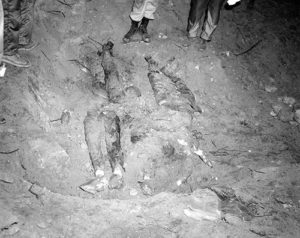 Aug 5: FBI agents uncover the bodies of civil rights workers Michael Schwerner, Andrew Goodman and James Chaney. The bodies are found in an earthen dam on a farm near Philadelphia, Mississippi, where they disappeared on June 21.
Aug 5: FBI agents uncover the bodies of civil rights workers Michael Schwerner, Andrew Goodman and James Chaney. The bodies are found in an earthen dam on a farm near Philadelphia, Mississippi, where they disappeared on June 21.
![]() Aug 5: U.S. aircraft from the carriers USS Ticonderoga and USS Constellation bomb targets in North Vietnam in retaliation for the alleged August 4 attack in the Gulf of Tonkin. One A-1 is hit by anti-aircraft fire, and the pilot, Richard C. Sather, is killed. He is the first American to be killed inside of North Vietnam. Another A-4 is hit by ground fire. The pilot parachutes safely and is taken prisoner.
Aug 5: U.S. aircraft from the carriers USS Ticonderoga and USS Constellation bomb targets in North Vietnam in retaliation for the alleged August 4 attack in the Gulf of Tonkin. One A-1 is hit by anti-aircraft fire, and the pilot, Richard C. Sather, is killed. He is the first American to be killed inside of North Vietnam. Another A-4 is hit by ground fire. The pilot parachutes safely and is taken prisoner.
![]()
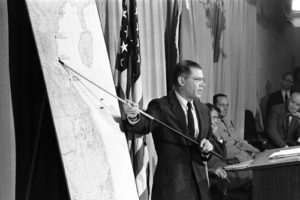 Aug 7: The United States Congress passes the Gulf of Tonkin Resolution, giving U.S. President Lyndon B. Johnson broad war powers to deal with North Vietnamese attacks on U.S. forces. The vote is unanimous in the House of Representatives, and 88-2 in the Senate. (Only Sens. Wayne Morse (D-OR) and Ernest Gruening (D-AK) vote “no.” Both will lose their re-election bids in 1968.) The resolution will serve as authorization for Johnson’s massive escalation of American involvement in Vietnam.
Aug 7: The United States Congress passes the Gulf of Tonkin Resolution, giving U.S. President Lyndon B. Johnson broad war powers to deal with North Vietnamese attacks on U.S. forces. The vote is unanimous in the House of Representatives, and 88-2 in the Senate. (Only Sens. Wayne Morse (D-OR) and Ernest Gruening (D-AK) vote “no.” Both will lose their re-election bids in 1968.) The resolution will serve as authorization for Johnson’s massive escalation of American involvement in Vietnam.
![]() Aug 11: The Beatles’ film A Hard Day’s Night is released in the U.S. and Canada.
Aug 11: The Beatles’ film A Hard Day’s Night is released in the U.S. and Canada.
![]() Aug 14: Mark Pocan, American Democratic Congressman from Wisconsin, is born.
Aug 14: Mark Pocan, American Democratic Congressman from Wisconsin, is born.
![]() Aug 16: South Vietnam undergoes another coup as Major Gen. Nguyễn Khánh ousts the figurehead President Dương Văn Minh. A new constitution, written with the help of the U.S. Embassy, establishes a 62-member military revolutionary council that can veto Khánh’s decisions.
Aug 16: South Vietnam undergoes another coup as Major Gen. Nguyễn Khánh ousts the figurehead President Dương Văn Minh. A new constitution, written with the help of the U.S. Embassy, establishes a 62-member military revolutionary council that can veto Khánh’s decisions.
![]() Aug 18: The International Olympic Committee bans South Africa from participating in the Olympic games over that country’s apartheid policies.
Aug 18: The International Olympic Committee bans South Africa from participating in the Olympic games over that country’s apartheid policies.
![]()
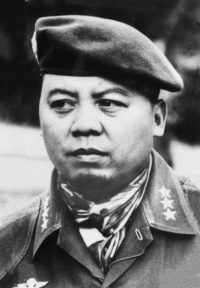 Aug 25: Major Gen. Nguyễn Khánh resigns as South Vietnam’s President only nine days after taking power in a coup. After a wave of student protests and riots, the military revolutionary council replaces the presidency with a three-man junta consisting of Khánh, his predecessor Dương Văn Minh, and Gen. Trần Thiện Khiêm.
Aug 25: Major Gen. Nguyễn Khánh resigns as South Vietnam’s President only nine days after taking power in a coup. After a wave of student protests and riots, the military revolutionary council replaces the presidency with a three-man junta consisting of Khánh, his predecessor Dương Văn Minh, and Gen. Trần Thiện Khiêm.
![]() Aug 27: Australian director and screenwriter Stephan Elliot is born. He is best known for The Adventures of Priscilla, Queen of the Desert.
Aug 27: Australian director and screenwriter Stephan Elliot is born. He is best known for The Adventures of Priscilla, Queen of the Desert.
![]() Aug 27: Walt Disney’s Mary Poppins premieres in Los Angeles.
Aug 27: Walt Disney’s Mary Poppins premieres in Los Angeles.
![]()
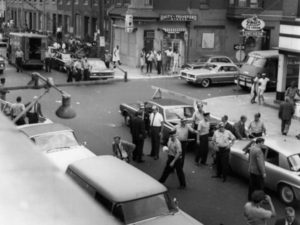 Aug 28: Race riots break out in Philadelphia when two police officers, one white and one black, arrest a black woman whose stalled car was blocking an intersection. The arrest triggers broader tensions between the police and African-American residents over several well-publicized allegations of police brutality. Rioting quickly escalates when rumors spread through the city that police had beaten and killed a pregnant black woman. During the next three days of rioting, 341 people are injured, 774 are arrested, and 225 mostly white-owned businesses are damaged or destroyed.
Aug 28: Race riots break out in Philadelphia when two police officers, one white and one black, arrest a black woman whose stalled car was blocking an intersection. The arrest triggers broader tensions between the police and African-American residents over several well-publicized allegations of police brutality. Rioting quickly escalates when rumors spread through the city that police had beaten and killed a pregnant black woman. During the next three days of rioting, 341 people are injured, 774 are arrested, and 225 mostly white-owned businesses are damaged or destroyed.
| ◄ | September | ► | ▲ | |||
|---|---|---|---|---|---|---|
| 1 | 2 | 3 | 4 | 5 | ||
| 6 | 7 | 8 | 9 | 10 | 11 | 12 |
| 13 | 14 | 15 | 16 | 17 | 18 | 19 |
| 20 | 21 | 22 | 23 | 24 | 25 | 26 |
| 27 | 28 | 29 | 30 | |||
![]()
 Sep 7: The “Daisy Ad,” one of the most controversial television political advertisements of all time, airs for the first and last time, during a commercial break on NBC. The spot begins with a little girl counting the petals of a daisy. when she reaches nine, the image freezes and the sound cross-fades to a countdown from ten to zero, at which time the girls image is replace by a the image and sound of a nuclear explosion. President Johnson’s voice closes the ad: “These are the stakes. To make a world in which all of God’s children can live, or to go into the dark. We must either love each other or we must die.” Republican National Committee chair Dean Burch is furious: “The only innuendo that can be drawn is that President Johnson is a careful man and that Barry Goldwater is careless and reckless. It is libel per se. It is a violent political lie.” The ad only airs once before being immediately pulled by the campaign. But it will be aired many more times in its entirety as part of nightly news broadcasts and current affairs discussion programs.
Sep 7: The “Daisy Ad,” one of the most controversial television political advertisements of all time, airs for the first and last time, during a commercial break on NBC. The spot begins with a little girl counting the petals of a daisy. when she reaches nine, the image freezes and the sound cross-fades to a countdown from ten to zero, at which time the girls image is replace by a the image and sound of a nuclear explosion. President Johnson’s voice closes the ad: “These are the stakes. To make a world in which all of God’s children can live, or to go into the dark. We must either love each other or we must die.” Republican National Committee chair Dean Burch is furious: “The only innuendo that can be drawn is that President Johnson is a careful man and that Barry Goldwater is careless and reckless. It is libel per se. It is a violent political lie.” The ad only airs once before being immediately pulled by the campaign. But it will be aired many more times in its entirety as part of nightly news broadcasts and current affairs discussion programs.
![]() Sep 8: With the first day after Labor Day being the traditional start of the school year, public schools across the South open for the first time since the passage of the Civil Rights Act which prohibits racial segregation in the public schools. Desegregation proceeds peacefully across much of the South, although school officials in Canton, Mississippi refuse to enroll thirteen black students in an all-white high school without a court order.
Sep 8: With the first day after Labor Day being the traditional start of the school year, public schools across the South open for the first time since the passage of the Civil Rights Act which prohibits racial segregation in the public schools. Desegregation proceeds peacefully across much of the South, although school officials in Canton, Mississippi refuse to enroll thirteen black students in an all-white high school without a court order.
![]() Sep 13: In South Vietnam, a coup attempt threatens to topple the the ruling junta of General Nguyễn Khánh. The attempted coup, headed by Gens. Lâm Văn Phát and Dương Văn Đức will collapse the next day.
Sep 13: In South Vietnam, a coup attempt threatens to topple the the ruling junta of General Nguyễn Khánh. The attempted coup, headed by Gens. Lâm Văn Phát and Dương Văn Đức will collapse the next day.
![]()
 Sep 13: A dramatic escape from East Berlin results in U.S. Army Soldiers fighting a gun battle with East German border guards. When an Michael Meyer tries to escape across the Berlin Wall, East Germany boarder guards begin firing at him and into West Germany. “Because communist bullets were hitting West Berlin territory,” a police officer tells reporters, “West Berlin police on duty at the wall opened fire.” A U.S soldier and a West Berlin policeman hold off the border guards with a pistol and tear gas while civilians and fireman comes to Meyer’s aid, who was wounded in the fighting.
Sep 13: A dramatic escape from East Berlin results in U.S. Army Soldiers fighting a gun battle with East German border guards. When an Michael Meyer tries to escape across the Berlin Wall, East Germany boarder guards begin firing at him and into West Germany. “Because communist bullets were hitting West Berlin territory,” a police officer tells reporters, “West Berlin police on duty at the wall opened fire.” A U.S soldier and a West Berlin policeman hold off the border guards with a pistol and tear gas while civilians and fireman comes to Meyer’s aid, who was wounded in the fighting.
![]()
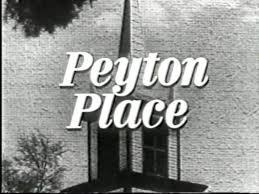 Sep 15: The American prime time soap opera Peyton Place premieres on ABC. The program’s title will become a catch-phrase to describe any situation involving scandal and intrigue. This series marks the first major roles for Mia Farrow and Ryan O’Neal.
Sep 15: The American prime time soap opera Peyton Place premieres on ABC. The program’s title will become a catch-phrase to describe any situation involving scandal and intrigue. This series marks the first major roles for Mia Farrow and Ryan O’Neal.
![]() Sep 17: The sitcom Bewitched premieres on ABC, starring Elizabeth Montgomery, Dick York and Agnes Morehead and
Sep 17: The sitcom Bewitched premieres on ABC, starring Elizabeth Montgomery, Dick York and Agnes Morehead and
![]() Sep 17: The James Bond film Goldfinger, starring Sean Connery premieres in London.
Sep 17: The James Bond film Goldfinger, starring Sean Connery premieres in London.
![]() Sep 18: The Addams Family premieres on ABC.
Sep 18: The Addams Family premieres on ABC.
![]() Sep 19: Flipper premieres on NBC.
Sep 19: Flipper premieres on NBC.
![]() Sep 21: Malta becomes an independent nation after 164 years of British rule.
Sep 21: Malta becomes an independent nation after 164 years of British rule.
![]() Sep 21: The University of California, Berkeley, had announced a new policy in which, as of September 21, political groups would not be allowed to set up card tables and distribute literature at the corner of Telegraph Avenue and Bancroft Way as they always had. The new policy is needed, according to Dean of Students Katherine Towle, because the tables are blocking pedestrian traffic. When a group of students complain, Towle modifies the rule to only allow “informative” literature to be distributed. “Persuasive” literature and fundraising is banned. Students say this reveals the real issue. The problem isn’t traffic, it’s the political activity itself. Student groups vow to continue their activities as before.
Sep 21: The University of California, Berkeley, had announced a new policy in which, as of September 21, political groups would not be allowed to set up card tables and distribute literature at the corner of Telegraph Avenue and Bancroft Way as they always had. The new policy is needed, according to Dean of Students Katherine Towle, because the tables are blocking pedestrian traffic. When a group of students complain, Towle modifies the rule to only allow “informative” literature to be distributed. “Persuasive” literature and fundraising is banned. Students say this reveals the real issue. The problem isn’t traffic, it’s the political activity itself. Student groups vow to continue their activities as before.
![]() Sep 22: The spy-fiction action drama The Man from U.N.C.L.E. premieres on NBC.
Sep 22: The spy-fiction action drama The Man from U.N.C.L.E. premieres on NBC.
![]() Sep 22: The musical Fiddler on the Roof opens at the Imperial Theatre on Broadway for the first of 3,242 performances.
Sep 22: The musical Fiddler on the Roof opens at the Imperial Theatre on Broadway for the first of 3,242 performances.
![]()
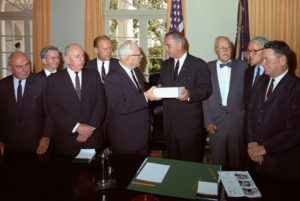 Sep 24: The Warren Commission report is presented to President Johnson. It concludes that President Kennedy was assassinated by Lee Harvey Oswald and that Oswald acted entirely alone. It also concludes that Jack Ruby acted alone when he killed Oswald two days later. The report consists of an 888-page summary backed by 26 volumes of supporting documents, testimony and depositions from 552 witnesses, and more than 3,100 exhibits.
Sep 24: The Warren Commission report is presented to President Johnson. It concludes that President Kennedy was assassinated by Lee Harvey Oswald and that Oswald acted entirely alone. It also concludes that Jack Ruby acted alone when he killed Oswald two days later. The report consists of an 888-page summary backed by 26 volumes of supporting documents, testimony and depositions from 552 witnesses, and more than 3,100 exhibits.
![]() Sep 24: The Munsters premieres on CBS.
Sep 24: The Munsters premieres on CBS.
![]() Sep 25: The Mozambican War of Independence from Portugal begins when the Mozambique Liberation Front (FRELIMO) attacks an Portuguese Army outpost in Chai, near the border with Tanzania. The war will drag on for more than a decade.
Sep 25: The Mozambican War of Independence from Portugal begins when the Mozambique Liberation Front (FRELIMO) attacks an Portuguese Army outpost in Chai, near the border with Tanzania. The war will drag on for more than a decade.
![]() Sep 25: Gomer Pyle, U.S.M.C. premieres on CBS. It is a spin-off from The Andy Griffith Show, which has been on the air since 1960.
Sep 25: Gomer Pyle, U.S.M.C. premieres on CBS. It is a spin-off from The Andy Griffith Show, which has been on the air since 1960.
![]() Sep 26: Gilligan’s Island premieres on CBS.
Sep 26: Gilligan’s Island premieres on CBS.
![]() Sep 27: The Warren Commission Report is released to the public.
Sep 27: The Warren Commission Report is released to the public.
![]() Sep 30: At the University of California, Berkeley, students continued to defy the administration’s ban on setting up card tables and distributing political literature at the corner of Telegraph Ave. and Bancroft Way near the university’s administration building. At noon, Dean of Students Alreigh Williams takes the names of five students and tells them to be at his office at 3:00 for disciplinary action. In the next three hours, more than 350 people sign a petition accepting equal responsibility and ask to share in the penalties. When 3:00 comes around, 400 students report to Williams’ office with more on the way. Williams refuses to see them. Later that evening, the students will learn that the five students and three leaders of the demonstration are indefinitely suspended.
Sep 30: At the University of California, Berkeley, students continued to defy the administration’s ban on setting up card tables and distributing political literature at the corner of Telegraph Ave. and Bancroft Way near the university’s administration building. At noon, Dean of Students Alreigh Williams takes the names of five students and tells them to be at his office at 3:00 for disciplinary action. In the next three hours, more than 350 people sign a petition accepting equal responsibility and ask to share in the penalties. When 3:00 comes around, 400 students report to Williams’ office with more on the way. Williams refuses to see them. Later that evening, the students will learn that the five students and three leaders of the demonstration are indefinitely suspended.
| ◄ | October | ► | ▲ | |||
|---|---|---|---|---|---|---|
| 1 | 2 | 3 | ||||
| 4 | 5 | 6 | 7 | 8 | 9 | 10 |
| 11 | 12 | 13 | 14 | 15 | 16 | 17 |
| 18 | 19 | 20 | 21 | 22 | 23 | 24 |
| 25 | 26 | 27 | 28 | 29 | 30 | 31 |
![]()
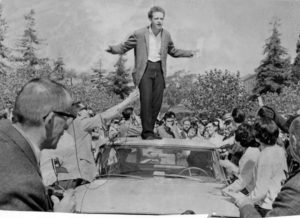 Oct 1: At noon, a rally to takes place in front of the University of California’s administration building to protest the free speech limitations imposed by the administration and the suspension of eight students who violated the ban. Tables are set up in defiance of the ban on distributing “persuasive” literature. When campus police arrest Jack Winberg, a CORE volunteer, and place him inside the squad car, thousands of student block the car from leaving. Berkeley junior Mario Savio jumps up on the squad car’s roof to address the crowd, and the Berkeley Free Speech Movement is born. The standoff continues for the next thirty-six hours with Weinberg in the squad car and several thousand students surrounding it to prevent it from leaving. It finally ends when University President Clark Kerr and demonstration leaders reach a compromise that commits the parties to work together for a mutually-agreeable policy.
Oct 1: At noon, a rally to takes place in front of the University of California’s administration building to protest the free speech limitations imposed by the administration and the suspension of eight students who violated the ban. Tables are set up in defiance of the ban on distributing “persuasive” literature. When campus police arrest Jack Winberg, a CORE volunteer, and place him inside the squad car, thousands of student block the car from leaving. Berkeley junior Mario Savio jumps up on the squad car’s roof to address the crowd, and the Berkeley Free Speech Movement is born. The standoff continues for the next thirty-six hours with Weinberg in the squad car and several thousand students surrounding it to prevent it from leaving. It finally ends when University President Clark Kerr and demonstration leaders reach a compromise that commits the parties to work together for a mutually-agreeable policy.
![]()
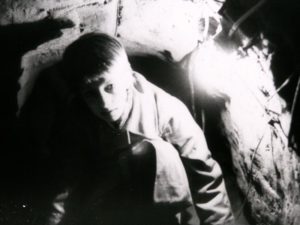 Oct 5: Over a 48-hour period, 57 East Berliners escape through a narrow tunnel under the Berlin Wall to West Berlin. One East German border guard is killed in the confusion when the tunnel is discovered.
Oct 5: Over a 48-hour period, 57 East Berliners escape through a narrow tunnel under the Berlin Wall to West Berlin. One East German border guard is killed in the confusion when the tunnel is discovered.
![]() Oct 7: The film Fail-Safe premieres
Oct 7: The film Fail-Safe premieres
![]() Oct 10-24: The 1964 Summer Olympics are held in Tokyo.
Oct 10-24: The 1964 Summer Olympics are held in Tokyo.
![]() Oct 12: The Soviet Union launches Voskhod 1 into Earth orbit carrying three cosmonauts. This is the first launch of a spacecraft with more than 1 crew member.
Oct 12: The Soviet Union launches Voskhod 1 into Earth orbit carrying three cosmonauts. This is the first launch of a spacecraft with more than 1 crew member.
![]() Oct 14: Nikita Khrushchev is deposed as leader of the Soviet Union. His departure is labeled a “voluntary retirement.” Leonid Brezhnev becomes Community Party leader, which effectively makes him the leader of the Soviet Union. Alexei Kosygin becomes Premier.
Oct 14: Nikita Khrushchev is deposed as leader of the Soviet Union. His departure is labeled a “voluntary retirement.” Leonid Brezhnev becomes Community Party leader, which effectively makes him the leader of the Soviet Union. Alexei Kosygin becomes Premier.
![]() Oct 14: At the age of thirty-five, Dr. Martin Luther King, Jr., becomes the youngest person to be named the winer of the Nobel Peace Prize. Reactions from the South are nearly universally negative. The Birmingham Post-Herald writes, “No matter what they think of King in Europe… the people in the South know that violence and conflict follow in his trail. … Despite the protestations of ‘non-violence’ he and his organization always seem to lead to violence.” The city’s notorious police commissioner Bull Connor, says, “They’re scraping the bottom of the barrel. He’s caused more strife and trouble than anyone I can think of.” St. Augustine, Florida police chief Virgil Stuart dismisses the prize: “I consider it one of the biggest jokes of the year. How can you win the peace prize when you stir up all the trouble he did down here?” Former Mississippi Gov. Ros Barnett says, “If a prize should be offered to the man who has created more strife, turmoil and misunderstanding than anyone else in American, he would be entitled to it.” Florida Gov. Farris Bryant called him “a hindrance to law and order.” But Atlanta mayor Ivan Allen extends the city’s congratulations to the Atlanta resident, saying King fully deserves the honor.
Oct 14: At the age of thirty-five, Dr. Martin Luther King, Jr., becomes the youngest person to be named the winer of the Nobel Peace Prize. Reactions from the South are nearly universally negative. The Birmingham Post-Herald writes, “No matter what they think of King in Europe… the people in the South know that violence and conflict follow in his trail. … Despite the protestations of ‘non-violence’ he and his organization always seem to lead to violence.” The city’s notorious police commissioner Bull Connor, says, “They’re scraping the bottom of the barrel. He’s caused more strife and trouble than anyone I can think of.” St. Augustine, Florida police chief Virgil Stuart dismisses the prize: “I consider it one of the biggest jokes of the year. How can you win the peace prize when you stir up all the trouble he did down here?” Former Mississippi Gov. Ros Barnett says, “If a prize should be offered to the man who has created more strife, turmoil and misunderstanding than anyone else in American, he would be entitled to it.” Florida Gov. Farris Bryant called him “a hindrance to law and order.” But Atlanta mayor Ivan Allen extends the city’s congratulations to the Atlanta resident, saying King fully deserves the honor.
![]()
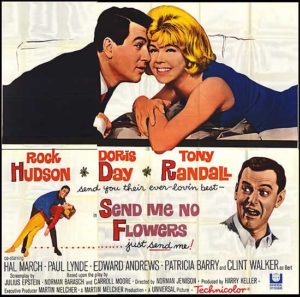 Oct 14: The last of the Rock Hudson-Doris Day films, Send Me No Flowers, is released.
Oct 14: The last of the Rock Hudson-Doris Day films, Send Me No Flowers, is released.
![]() Oct 15: American composer and songwriter Cole Porter dies at the age of 73.
Oct 15: American composer and songwriter Cole Porter dies at the age of 73.
![]() Oct 15: General elections for the United Kingdom’s House of Commons brings thirteen years of Conservative rule to and end. Labour wins a slim two-seat majority, and Harold Wilson becomes the next Prime Minister.
Oct 15: General elections for the United Kingdom’s House of Commons brings thirteen years of Conservative rule to and end. Labour wins a slim two-seat majority, and Harold Wilson becomes the next Prime Minister.
![]() Oct 16: The People’s Republic of China becomes the world’s fifth nuclear power when it detonates a 25-kiloton atomic bomb in Xinjiang.
Oct 16: The People’s Republic of China becomes the world’s fifth nuclear power when it detonates a 25-kiloton atomic bomb in Xinjiang.
![]() Oct 21: The film version of the Broadway musical My Fair Lady premieres at Broadway’s Criterion Theater in New York City.
Oct 21: The film version of the Broadway musical My Fair Lady premieres at Broadway’s Criterion Theater in New York City.
![]()
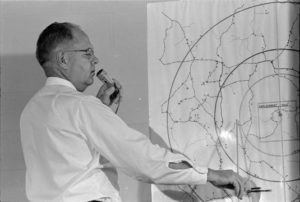 Oct 22: A small 12-kiloton nuclear device, only one-third the strength of the Hiroshima bomb) is detonated half a mile underground in the Tatum Salt Dome in Lamar County, Mississippi. The detonation is part of a test to develop detection methods for underground nuclear explosions. The shock wave lifts the ground 4 inches in a ripple that spread for miles across the countryside. Just before the blast, a US Atomic Energy Commission employee places a humorous sign over the blast site: “The South shall rise again.”
Oct 22: A small 12-kiloton nuclear device, only one-third the strength of the Hiroshima bomb) is detonated half a mile underground in the Tatum Salt Dome in Lamar County, Mississippi. The detonation is part of a test to develop detection methods for underground nuclear explosions. The shock wave lifts the ground 4 inches in a ripple that spread for miles across the countryside. Just before the blast, a US Atomic Energy Commission employee places a humorous sign over the blast site: “The South shall rise again.”
![]() Oct 24: Zambia, formerly the British protectorate of Northern Rhodesia, becomes independent.
Oct 24: Zambia, formerly the British protectorate of Northern Rhodesia, becomes independent.
![]()
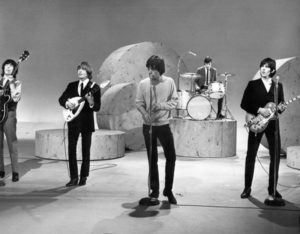 Oct 25: The Rolling Stones perform on The Ed Sullivan Show for the first time. Unlike the Beatles who dressed in jackets and ties, Mick Jagger wears a sweatshirt. Producers say they are deluged with complaints about the band’s “untidy appearance… in the matter of dress and shampoo.” The following day, Ed Sullivan insists he’ll never have them back. They will return six months later.
Oct 25: The Rolling Stones perform on The Ed Sullivan Show for the first time. Unlike the Beatles who dressed in jackets and ties, Mick Jagger wears a sweatshirt. Producers say they are deluged with complaints about the band’s “untidy appearance… in the matter of dress and shampoo.” The following day, Ed Sullivan insists he’ll never have them back. They will return six months later.
![]() Oct 31: The Supremes’ single “Baby Love” begins its four week run at the top of the charts.
Oct 31: The Supremes’ single “Baby Love” begins its four week run at the top of the charts.
![]() Oct 31: Barbra Streisand’s album People begins its five week run at the top of the album charts.
Oct 31: Barbra Streisand’s album People begins its five week run at the top of the album charts.
| ◄ | November | ► | ▲ | |||
|---|---|---|---|---|---|---|
| 1 | 2 | 3 | 4 | 5 | 6 | 7 |
| 8 | 9 | 10 | 11 | 12 | 13 | 14 |
| 15 | 16 | 17 | 18 | 19 | 20 | 21 |
| 22 | 23 | 24 | 25 | 26 | 27 | 28 |
| 29 | 30 | |||||
![]()
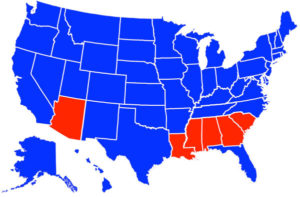 Nov 3: President Lyndon Johnson defeats Sen. Barry Goldwater in a 61%-39% popular vote landslide, taking 486 out of 538 electoral votes. Goldwater carries just six states: his home state of Arizona, and Louisiana, Mississippi, Alabama, Georgia, and South Carolina. This is the first time since Reconstruction that four of those five Southern states votes for a Republican. In Mississippi, where FDR won 97% of the vote in 1936, Goldwater takes 87%. He wins a larger share in all five Southern States than he does in Arizona, where he squeaks out a 1% margin of victory over Johnson. When Johnson signed the Civil Rights Act into law on July 2, he reportedly told an aid, “We have lost he South for a generation.” These results seem to confirm that prophecy, and they will inspire Nixon’s “southern strategy” in his 1968 comeback.
Nov 3: President Lyndon Johnson defeats Sen. Barry Goldwater in a 61%-39% popular vote landslide, taking 486 out of 538 electoral votes. Goldwater carries just six states: his home state of Arizona, and Louisiana, Mississippi, Alabama, Georgia, and South Carolina. This is the first time since Reconstruction that four of those five Southern states votes for a Republican. In Mississippi, where FDR won 97% of the vote in 1936, Goldwater takes 87%. He wins a larger share in all five Southern States than he does in Arizona, where he squeaks out a 1% margin of victory over Johnson. When Johnson signed the Civil Rights Act into law on July 2, he reportedly told an aid, “We have lost he South for a generation.” These results seem to confirm that prophecy, and they will inspire Nixon’s “southern strategy” in his 1968 comeback.
![]() Nov 3: The U.S. General Election also gives the Democrats a large majority in Congress. The Democrats retain a 295-140 majority in the House of Representatives, and a 68-32 advantage in the Senate.
Nov 3: The U.S. General Election also gives the Democrats a large majority in Congress. The Democrats retain a 295-140 majority in the House of Representatives, and a 68-32 advantage in the Senate.
![]()
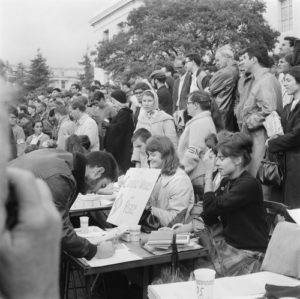 Nov 9: The Free Speech Movement at the University of California, Berkeley resumes its protest against the administration’s policy prohibiting political groups from setting up card tables and distributing literature on campus. Eight to ten tables are set up in front of Sproul Hall, the administration building. The demonstration lasts about two hours and draws a crowd of about 500 students. Campus officials begin taking names of students manning the tables. After the students identify themselves, they leave and other students step up to take their places. Some 75 names are taken before officials decide to stop taking more names. Similar demonstrations will continue through the week.
Nov 9: The Free Speech Movement at the University of California, Berkeley resumes its protest against the administration’s policy prohibiting political groups from setting up card tables and distributing literature on campus. Eight to ten tables are set up in front of Sproul Hall, the administration building. The demonstration lasts about two hours and draws a crowd of about 500 students. Campus officials begin taking names of students manning the tables. After the students identify themselves, they leave and other students step up to take their places. Some 75 names are taken before officials decide to stop taking more names. Similar demonstrations will continue through the week.
![]()
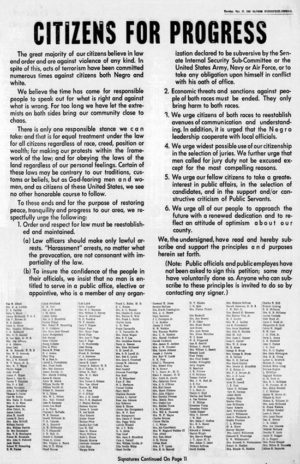 Nov 18: McComb, Mississippi desegregates, more or less, without incident, more or less. The southern Mississippi town had been one of the more violent towns in the South during the civil in recent ears, with active Klan activity, murders, and eleven bombings directed against African-Americans since the Civil Rights Act was signed just four months before. Now that the elections are over, the NAACP selects the small town to test compliance with the Civil Rights Act. A small group of African-American men and women travel to McComb and are able rent rooms in two motels, eat at three lunch counters, and sit wherever they want in the movie theater. Forty state police and 20 FBI agents augment local police to make sure there is no violence. Two days earlier, the mayor and 20 business leaders paid for a two-page ad, signed by 650 residents, in the local paper urging everyone to peacefully comply with the law. Mayor Gordon Burt issued a separate statement reminding everyone that “the eyes of the entire nation will be directed our way” and that past acts of violence were “definitely derogatory to the City of McComb.” Those preparations seem to have worked. Charles Evers, brother of the slain Medgar Evers and head of the state NAACP, says that the McCombs tests are “the most important breakthrough we have had because McComb has been the worst city we had.” Mayor Burt tells reporters that while he is still a segregationist, “the people of McComb can and will do the right thing.”
Nov 18: McComb, Mississippi desegregates, more or less, without incident, more or less. The southern Mississippi town had been one of the more violent towns in the South during the civil in recent ears, with active Klan activity, murders, and eleven bombings directed against African-Americans since the Civil Rights Act was signed just four months before. Now that the elections are over, the NAACP selects the small town to test compliance with the Civil Rights Act. A small group of African-American men and women travel to McComb and are able rent rooms in two motels, eat at three lunch counters, and sit wherever they want in the movie theater. Forty state police and 20 FBI agents augment local police to make sure there is no violence. Two days earlier, the mayor and 20 business leaders paid for a two-page ad, signed by 650 residents, in the local paper urging everyone to peacefully comply with the law. Mayor Gordon Burt issued a separate statement reminding everyone that “the eyes of the entire nation will be directed our way” and that past acts of violence were “definitely derogatory to the City of McComb.” Those preparations seem to have worked. Charles Evers, brother of the slain Medgar Evers and head of the state NAACP, says that the McCombs tests are “the most important breakthrough we have had because McComb has been the worst city we had.” Mayor Burt tells reporters that while he is still a segregationist, “the people of McComb can and will do the right thing.”
![]() Nov 18: FBI director J. Edgar Hoover is clearly in a bad mood when he holds a very rare press briefing with reporters for the of the Women’s National Press Association. Hoover, who is still smarting over the Warren Commission’s criticisms of FBI failures in the days leading to the Kennedy Assassination, blasts the Commission for “Monday morning quarterbacking” for the FBI’s failure to notify Dallas police about Lee Harvey Oswald’s previous activities in the Soviet Union and Mexico City. He says that his department, in response, has now turned over to the Secret Service the names of “thousands of beatnicks, crackpots and kooks.” Hoover also has choice criticisms of “red-necked sheriffs” in the South, the Klan and American Nazis, and “bleeding heart judges” alike. But he saved his harshest criticism for Dr. Martin Luther King, Jr., who was recently named 1964’s Nobel Peace Prize laureate. Hoover calls King “the most notorious liar in the country,” adding: “Feel free to print that.” King will take the high road. In a statement that will be released the next day, King will say: “I cannot conceive of Mr. Hoover making a statement like this without being under extreme pressure. … I have nothing by sympathy for this man who has served his country so well.”
Nov 18: FBI director J. Edgar Hoover is clearly in a bad mood when he holds a very rare press briefing with reporters for the of the Women’s National Press Association. Hoover, who is still smarting over the Warren Commission’s criticisms of FBI failures in the days leading to the Kennedy Assassination, blasts the Commission for “Monday morning quarterbacking” for the FBI’s failure to notify Dallas police about Lee Harvey Oswald’s previous activities in the Soviet Union and Mexico City. He says that his department, in response, has now turned over to the Secret Service the names of “thousands of beatnicks, crackpots and kooks.” Hoover also has choice criticisms of “red-necked sheriffs” in the South, the Klan and American Nazis, and “bleeding heart judges” alike. But he saved his harshest criticism for Dr. Martin Luther King, Jr., who was recently named 1964’s Nobel Peace Prize laureate. Hoover calls King “the most notorious liar in the country,” adding: “Feel free to print that.” King will take the high road. In a statement that will be released the next day, King will say: “I cannot conceive of Mr. Hoover making a statement like this without being under extreme pressure. … I have nothing by sympathy for this man who has served his country so well.”
![]()
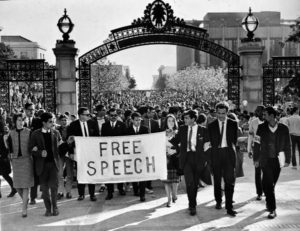 Nov 20: When the University of California Regents meet in Berkeley to discuss how to deal with with the Free Speech Movement that had formed the previous month. Mario Savio and other students protesters march through Sather Gate toward the Sproul Hall administration building and demand that student representatives meet with the Regents. The Regents ignore the demand and enact a policy statement prohibiting the advocacy of “illegal action,” which could include advocacy for civil disobedience. It leaves sole discretion in determining what is allowed under the policy in the hands of the administration. Regents also approve to beef up the size of the campus police force and staff of the Dean’s office.
Nov 20: When the University of California Regents meet in Berkeley to discuss how to deal with with the Free Speech Movement that had formed the previous month. Mario Savio and other students protesters march through Sather Gate toward the Sproul Hall administration building and demand that student representatives meet with the Regents. The Regents ignore the demand and enact a policy statement prohibiting the advocacy of “illegal action,” which could include advocacy for civil disobedience. It leaves sole discretion in determining what is allowed under the policy in the hands of the administration. Regents also approve to beef up the size of the campus police force and staff of the Dean’s office.
![]()
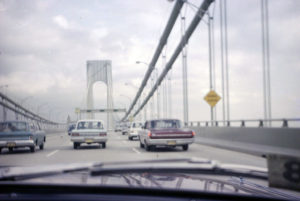 Nov 21: The world’s longest suspension bridge, the Verrazano Narrows Bridge, opens to traffic. The bridge links Staten Island and Brooklyn for the first time. In the first 24 hours after the bridge’s opening, 100,000 cars make the crossing.
Nov 21: The world’s longest suspension bridge, the Verrazano Narrows Bridge, opens to traffic. The bridge links Staten Island and Brooklyn for the first time. In the first 24 hours after the bridge’s opening, 100,000 cars make the crossing.
![]() Nov 29: On the First Sunday of Advent, Roman Catholics all over the world arrive in their local parishes to participate in a Mass that is largely given in their native languages.
Nov 29: On the First Sunday of Advent, Roman Catholics all over the world arrive in their local parishes to participate in a Mass that is largely given in their native languages.
| ◄ | December | ▲ | ||||
|---|---|---|---|---|---|---|
| 1 | 2 | 3 | 4 | 5 | ||
| 6 | 7 | 8 | 9 | 10 | 11 | 12 |
| 13 | 14 | 15 | 16 | 17 | 18 | 19 |
| 20 | 21 | 22 | 23 | 24 | 25 | 26 |
| 27 | 28 | 29 | 30 | 31 | ||
![]()
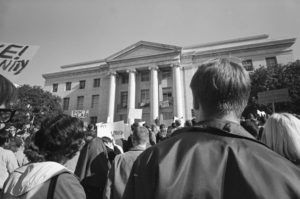 Dec 2: During a Free Speech Movement rally at the University of California in Berkeley, Mario Savio addresses a crowed of 5,000 from the steps of Sproul Hall, which houses the campus administration. The students are protesting the U.C. Regents’ singling out of several protest leaders for punishment and prohibiting the distribution of political literature on campus. In what will be known as the “Bodies Upon the Gears” speech, Savio says: “There is a time when the operation of the machine becomes so odious, makes you so sick at heart, that you can’t take part; and you’ve got to put your bodies upon the gears and upon the wheels, upon all the apparatus, and you’ve got to make it stop. And you’ve got to indicate to the people who own it, that unless you’re free, the machine will be prevented from working at all.” More than a thousand students occupy Sproul Hall.
Dec 2: During a Free Speech Movement rally at the University of California in Berkeley, Mario Savio addresses a crowed of 5,000 from the steps of Sproul Hall, which houses the campus administration. The students are protesting the U.C. Regents’ singling out of several protest leaders for punishment and prohibiting the distribution of political literature on campus. In what will be known as the “Bodies Upon the Gears” speech, Savio says: “There is a time when the operation of the machine becomes so odious, makes you so sick at heart, that you can’t take part; and you’ve got to put your bodies upon the gears and upon the wheels, upon all the apparatus, and you’ve got to make it stop. And you’ve got to indicate to the people who own it, that unless you’re free, the machine will be prevented from working at all.” More than a thousand students occupy Sproul Hall.
![]()
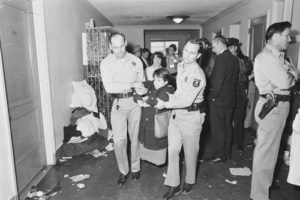 Dec 3: At 3:45 a.m., police begin arresting about 814 students who have taken over the Sproul Hall administration building at the University of California, Berkeley. It takes twelve hours to remove all of the protesters. While that is happening, an estimated 7,000 students gather in Sproul Plaza. A rally had been planned for noon, but rally leaders cancel it, fearing violence. Large groups of faculty members and grad students begin a campus strike.
Dec 3: At 3:45 a.m., police begin arresting about 814 students who have taken over the Sproul Hall administration building at the University of California, Berkeley. It takes twelve hours to remove all of the protesters. While that is happening, an estimated 7,000 students gather in Sproul Plaza. A rally had been planned for noon, but rally leaders cancel it, fearing violence. Large groups of faculty members and grad students begin a campus strike.
![]() Dec 6: Rudolph the Red-Nosed Reindeer premieres on NBC.
Dec 6: Rudolph the Red-Nosed Reindeer premieres on NBC.
![]()
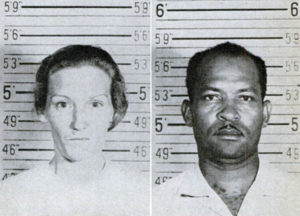 Dec 7: In the case of McLaughlin v. Florida, the U.S. Supreme Court strikes down as unconstitutional a Florida law that prohibits interracial cohabitation. The case involves a black man, Dewey McLaughlin, and a white woman, Connie Hoffman, who lived together in Miami and were sentenced to 30 days in jail. The court rules that because Florida law doesn’t ban cohabitation for couples of the same race, the law violates the Equal Protection clause of the Fourteenth Amendment. The court’s ruling avoids for now the question of interracial marriage laws.
Dec 7: In the case of McLaughlin v. Florida, the U.S. Supreme Court strikes down as unconstitutional a Florida law that prohibits interracial cohabitation. The case involves a black man, Dewey McLaughlin, and a white woman, Connie Hoffman, who lived together in Miami and were sentenced to 30 days in jail. The court rules that because Florida law doesn’t ban cohabitation for couples of the same race, the law violates the Equal Protection clause of the Fourteenth Amendment. The court’s ruling avoids for now the question of interracial marriage laws.
![]() Dec 8: The University of California, Berkeley’s Academic Senate votes 824 to 115 in favor of a resolution calling on the administration to stop all attempts at regulating free speech on campus.
Dec 8: The University of California, Berkeley’s Academic Senate votes 824 to 115 in favor of a resolution calling on the administration to stop all attempts at regulating free speech on campus.
![]()
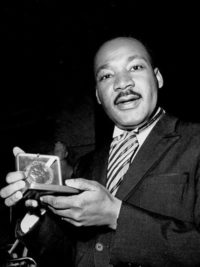 Dec 10: In a ceremony in Oslo, Dr. Martin Luther King, Jr., accepts the Nobel Peace Prize. Dr. King says, “I must ask why this prize is awarded to a movement… which has not won the very peace and brotherhood which is the essence of the Nobel Prize. I conclude that this award, which I receive on behalf of that movement is profound recognition that nonviolence is the answer to the crucial political and moral question of our time— the need for man to overcome oppression and violence without resorting to violence and oppression.”
Dec 10: In a ceremony in Oslo, Dr. Martin Luther King, Jr., accepts the Nobel Peace Prize. Dr. King says, “I must ask why this prize is awarded to a movement… which has not won the very peace and brotherhood which is the essence of the Nobel Prize. I conclude that this award, which I receive on behalf of that movement is profound recognition that nonviolence is the answer to the crucial political and moral question of our time— the need for man to overcome oppression and violence without resorting to violence and oppression.”
![]() Dec 11: Singer-songwriter Sam Cooke is shot and killed at a motel in Los Angeles.
Dec 11: Singer-songwriter Sam Cooke is shot and killed at a motel in Los Angeles.
![]()
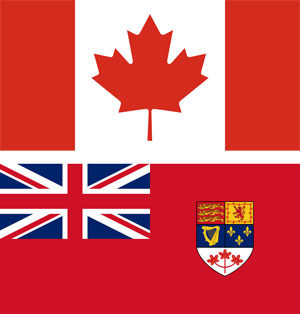 Dec 17: The new flag of Canada is raised for the first time outside the Parliament building in Ottawa shortly after the Senate votes to approve the new Maple Leaf design. The House of Commons had approved the design earlier in the week. The new flag is the country’s first official flag. Previously, the Red Ensign had been used, which features the British Union Jack in the upper corner, and the Canadian coat of arms. Because the Red Ensign so prominently displays the Union Jack, the flag posed problems when Canada sent peacekeeping troops to Egypt during the Suez Crisis, with Egypt objecting to displaying the symbol of one of the belligerents. The ensign was also unpopular in Quebec for similar reasons. The new flag is intended to serve as a unique, unmistakably Canadian banner.
Dec 17: The new flag of Canada is raised for the first time outside the Parliament building in Ottawa shortly after the Senate votes to approve the new Maple Leaf design. The House of Commons had approved the design earlier in the week. The new flag is the country’s first official flag. Previously, the Red Ensign had been used, which features the British Union Jack in the upper corner, and the Canadian coat of arms. Because the Red Ensign so prominently displays the Union Jack, the flag posed problems when Canada sent peacekeeping troops to Egypt during the Suez Crisis, with Egypt objecting to displaying the symbol of one of the belligerents. The ensign was also unpopular in Quebec for similar reasons. The new flag is intended to serve as a unique, unmistakably Canadian banner.
![]() Dec 19: Yet another coup takes place in war-torn South Vietnam when the ruling military junta led by Gen. Nguyễn Khánh dissolves the High National Council and arrests some of its members. The next day, Khánh announces that an Armed Forces Council will rule the nation
Dec 19: Yet another coup takes place in war-torn South Vietnam when the ruling military junta led by Gen. Nguyễn Khánh dissolves the High National Council and arrests some of its members. The next day, Khánh announces that an Armed Forces Council will rule the nation
![]() Dec 21: Britain’s House of Commons votes to suspend the death sentence for five years. The death sentence will be permanently abolished in 1969.
Dec 21: Britain’s House of Commons votes to suspend the death sentence for five years. The death sentence will be permanently abolished in 1969.
![]() Dec 21: Comedian Lenny Bruce is sentenced to 4 months in prison in New York City following a 6-month obscenity trial. He was charged with three counts of giving obscene performances in a Greenwich Village cafe. The owner of Cafe Au Go Go is fined $1,000. Bruce is allowed to remain free on bond pending appeal.
Dec 21: Comedian Lenny Bruce is sentenced to 4 months in prison in New York City following a 6-month obscenity trial. He was charged with three counts of giving obscene performances in a Greenwich Village cafe. The owner of Cafe Au Go Go is fined $1,000. Bruce is allowed to remain free on bond pending appeal.
![[Emphasis Mine]](http://jimburroway.com/wp-content/uploads/2018/01/WacoRaid1953.jpg)